134 Economics Thesis Topics: Ideas for Outstanding Writing

Writing a thesis is not an easy task. For most of the students, it can be even intimidating, especially when you do not know where to start your research.
Here, we have provided an economics thesis topics list. After all, everyone knows that choosing the right idea is crucial when writing an academic paper. In economics, it can combine history, math, social studies, politics, and numerous other subjects. You should also have solid foundations and a sound factual basis for a thesis. Without these elements, you won’t be able to master your research paper.
The issue is:
It is not always clear what could be seen as an excellent economics thesis topic. Our experts can assist you with this challenge. This list contains some outstanding examples to get you started.
- ⭐ Thesis in Economics
- 🔥 Supreme Thesis Topics
- 👍 Bachelor’s Thesis
- 😲 Master’s Thesis

📊 Microeconomics
📈 macroeconomics.
- 🤔 Developmental
- 👨💼 Behavioral
- 💼 Financial
- 🌱 Agricultural
- 🤝 Sociology
- 📚 Ph.D. Topics
- 📝 How to Pick a Topic
⭐ What Does a Thesis in Economics Look Like?
A good thesis in economics is a blend between an empirical paper and a theoretical one. One of the essential steps in choosing a topic in economics is to decide which one you will write.
You may write, research, analyze statistical data and other information. Or build and study a specific economic model.
Or why not both!
Here are some questions you can ask when deciding what topic to choose:
- What has already been written on this topic?
- What economic variables will my paper study?
- Where should I look for the data?
- What econometrics techniques should I use?
- What type of model will I study?
The best way to understand what type of research you have to do is to write a thesis proposal. You will most probably be required to submit it anyway. Your thesis supervisor will examine your ideas, methods, list of secondary and primary sources. At some universities, the proposal will be graded.

After you get the initial feedback, you will have a clear idea of what to adjust before writing your thesis. Only then, you’ll be able to start.
🔥 Supreme Economics Thesis Topics List
- Fast fashion in India.
- The UK housing prices.
- Brexit and European trade.
- Behavioral economics.
- Healthcare macroeconomics.
- COVID-19’s economic impact.
- Global gender wage gap.
- Commodity dependence in Africa.
- International trade – developing countries.
- Climate change and business development.
👍 Economics Bachelor’s Thesis Topics
At the U.S. Universities, an undergraduate thesis is very uncommon. However, it depends on the Department Policy.
The biggest challenge with the Bachelor’s Thesis in economics concerns its originality. Even though you are not required to conduct entirely unique research, you have to lack redundant ideas.
You can easily avoid making this mistake by simply choosing one of these topics. Also, consider visiting IvyPanda essays database. It’s a perfect palce to conduct a brainstorming session and come up with fresh ideas for a paper, as well as get tons of inspiration.
- The impact of the oil industry on the economic development of Nigeria. The oil industry is vital for the economic development of Nigeria. In this thesis, students can discuss the notion of the resource curse. Analyze the reasons why general people are not benefiting from the oil industry. Why did it produce very little change in the social and economic growth of the country?
- Sports Marketing and Advertising: the impact it has on the consumers.
- Economic opportunities and challenges of investing in Kenya .
- Economic Development in the Tourism Industry in Africa. Since the early 1990s, tourism significantly contributed to the economic growth of African countries. In this thesis, students can talk about the characteristics of the tourist sector in Africa. Or elaborate on specific countries and how their national development plans look like.
- Globalization and its significance to business worldwide .
- Economic risks connected to investing in Turkey .
- The decline in employment rates as the biggest American economy challenge .
- The economics of alcohol abuse problems. In this thesis, students can develop several essential issues. First, they can examine how poverty is connected to alcohol abuse. Second, they can see the link between alcohol consumption and productivity. To sum up, students can elaborate on the economic costs of alcohol abuse.
- Causes and solutions for unemployment in Great Britain.
- Parallel perspective on Global Economic Order: China and America. This thesis can bring a comparative analysis of the economies to a new level. China and The US are the world’s two largest economies. These two countries have a significant impact on the global economic order. So, looking at the set of institutions, policies, rules can be constructive.
- The new international economic order after COVID-19
- Financial stability of the banking sector in China.
- New Electronic Payment Services in Russia.
- The influence of culture on different entrepreneurial behaviors.
- The impact of natural cultural practices on entrepreneurial activity.
- The relationships between national culture and individual behavior.
- The main reasons for salary inequalities in different parts of the U.S.
😲 Economics Master’s Thesis Topics
Student life can be fascinating, but it comes with its challenges. One of which is selecting your Master’s thesis topic.
Here is a list of topics for a Master’s thesis in economics. Are you pursuing MPhil in Economics and writing a thesis? Use the following ideas as an inspiration for that. They can also be helpful if you are working on a Master’s thesis in financial economics.
- The impact of visual aid in teaching home economics.
- The effect of income changes in consumer behaviors in America.
- Forces behind socio-economic inequalities in the United States. This thesis can explore three critical factors for socio-economic differences in the United States. In the past 30 years, social disparities increased in the United States. Some of the main reasons are technology, trade, and institutions.
- The relationships between economic growth and international development.
- Technological innovations and their influence on green and environmental products.
- The economics of non-solar renewable energy .

- The economic consequences of terrorism . Terrorism not only takes away lives and destroys property but also widely affects the economy. It creates uncertainty in the market, increases insurance claims, slows down investment projects, and tourism. This thesis can address all of the ways in which terrorism can affect economies.
- Corporate Social Responsibility (CSR) implementation in the Oil and Gas Industry in Africa.
- Use of incentives in behavioral economics.
- Economic opportunities and challenges of sustainable communities .
- Economics of nuclear power plants.
- Aid and financial help for emerging markets. This topic is very versatile. Students can look at both the positive and the adverse effects that funding has on the development. There are plenty of excellent examples. Besides, some theories call international help a form of neocolonialism.
- Multinational firms impact on economic growth in America .
- The effect of natural disasters on economic development in Asia.
- The influence of globalization on emerging markets and economic development.
📑 More Economics Thesis Topics: Theme
For some students, it makes more sense to center their search around a certain subject. Sometimes you have an econ area that interests you. You may have an idea about what you want to write, but you did not decide what it will be.
If that’s the case with you, then these economics thesis topics ideas are for you.
- An analysis of the energy market in Russia.
- The impact of game theory on economic development.
- The connection between minimum wage and market equilibrium.
- Gender differences in the labor market in the United States. This topic can shed light on gender differences in the labor market in the United States. In the past years, the overall inequality in labor in the markets decreased. However, there is still a lot of work that can be done.
- Economic reasons that influence the prices of oil .
- Relationship between the Lorenz curve and the Gini coefficient.
- Challenges of small businesses in the market economy.
- The changes in oil prices: causes and solutions . Universal economic principles do not always apply to the sale and purchase of the oil. The same happens with its cost. In the thesis, talk about what affects the prices. What are the solutions that can be implemented?
- The economic analysis of the impact of immigration on the American economy.

- Economic inequality as a result of globalization . Economic inequality becomes even more apparent on the global level. There is a common belief that globalization is the cause of that. Discuss what can be the solutions to these problems. This topic is vital to minimize the gap between the rich and the poor.
- The economic explanation of political dishonesty .
- Effect of Increasing Interest rates costs in Africa .
- The connection between game theory and microeconomics.
- Marketing uses in microeconomics.
- Financial liability in human-made environmental disasters.
- Banks and their role in the economy. Banks are crucial elements of any economy, and this topic covers why. You can explain how banks allow the goods and services to be exchanged. Talk about why banks are so essential for economic growth and stability.
- Inflation in the US and ways to reduce its impact.
- The connection between politics and economics.
- Income Dynamics and demographic economics.
- US Market Liquidity and macroeconomics.
- Macroeconomics and self-correction of the economy .
- The American economy, monetary policy, and monopolies .
- The importance of control in macroeconomics. One of the central topics in macroeconomics is grouped around the issue of control. It is quite reasonable that control over money and resources should become a topic of discussion.
- Analysis of Africa’s macroeconomics and its performance.
- Economics of education in developing markets.
- Problems and possible solutions for Japan macroeconomics .
- Comparative analysis of British macroeconomics concerning the US .
- Public policies and socio-economic disparities.
- The world problems through macroeconomic analysis. Indeed, macroeconomics is very complicated. There are many influences, details, and intricacies in it. However, it allows economists to use this complex set of tools to examine the world’s leading problems today.

- The connection between employment interest and money.
🤔 Development Economics
- Economics of development . This topic is very rich in content. First, explain what it is. Then pay particular attention to domestic and international policies that affect development, income distribution, and economic growth.
- The relation between development and incentive for migration.
- The impact of natural disasters on the economy and political stability of emerging markets.
- The economic consequences of population growth in developing countries.
- The role of industrialization in developing countries . The industrialization has been connected with the development. It promotes capital formation and catalyzes economic growth in emerging markets. In this thesis, you can talk about this correlation.
- Latin American economic development.
- Gender inequality and socio-economic development .
- Problems of tax and taxation in connection with economic growth.
- The economic impact of terrorism on developing markets.
- Religious decline as a key to economic development. Not everyone knows, but a lot of research has been done in the past years on the topic. It argues that decreased religious activity is connected with increased economic growth. This topic is quite controversial. Students who decide to write about it should be extra careful and polite.
👨💼 Behavioral Economics
- Risk Preferences in Rural South Africa.
- Behavioral Economics and Finance .
- Applied behavioral economics in marketing strategies. If you want to focus your attention on marketing, this topic is for you. Behavioral economics provides a peculiar lens to look at marketing strategies. It allows marketers to identify common behaviors and adapt their marketing strategies.
- The impact of behavioral finance on investment decisions.
- Behavioral Economics in Child Nutrition Programs in North Texas.
- Guidelines for Behavioral Economics in Healthcare Sector.
- Cognitive and behavioral theories in economics .
- Cross-cultural consumer behavior and marketing communication. Consumers are not only affected by personal characteristics, but also by the culture they are living in. This topic focuses on the extent it should determine marketing strategy and communication.
- Behavior implications of wealth and inequality.

- Optimism and pessimism for future behavior.
💼 Financial Economics
- Financial Economics for Infrastructure and Fiscal Policy .
- The use of the economic concept of human capital. Students can focus on the dichotomy between human and nonhuman capital. Many economists believe that human capital is the most crucial of all. Some approach this issue differently. Therefore, students should do their research and find where they stand on this issue.
- The analysis of the global financial crisis of 2020s. Share your thoughts, predictions, ideas. Analyze the economic situation that affects almost everyone in the world. This thesis topic will be fresh and original. It can help to start a good and fruitful conversation.
- The big data economic challenges for Volvo car.
- The connection between finance, economics, and accounting.
- Financial economics: Banks competition in the UK .
- Risk-Taking by mutual funds as a response to incentives.
- Managerial economics and financial accounting as a basis for business decisions.
- Stock market overreaction.
🌱 Agricultural Economics
- Agricultural economics and agribusiness.
- The vulnerability of agricultural business in African countries.
- Agricultural economics and environmental considerations of biofuels .
- Farmer’s contribution to agricultural social capital.
- Agricultural and resource economics. Agricultural and resource economics plays a huge role in development. They are subdivided into four main characteristics which in this topic, students can talk about: – mineral and energy resources; – soil resources, water resources; – biological resources. One or even all of them can be a focus of the thesis.
- Water as an economic good in irrigated agriculture.
- Agriculture in the economic development of Iran.
- The US Agricultural Food Policy and Production .
- Pesticides usage on agricultural products in California.

- An analysis of economic efficiency in agriculture. A lot of research has been done on the question of economic efficiency in agriculture. However, it does not mean there is no place for your study. You have to read a lot of secondary sources to see where your arguments can fit.
🤝Economic Sociology
- Theory, approach, and method in economics sociology.
- Economic sociology of capitalism. While economists believe in the positive effect capitalism has on the economy, the social effect is quite different. The “economic” part of the issue has been studied a lot. However, the sociology of it has been not. This thesis can be very intriguing to read.
- Political Economy and Economic Sociology.
- Gender and economic sociology .
- Progress, sociology, and economics.
- Data analysis in economics, sociology, environment .
- Economic sociology as a way to understand the human mind.
- Economic sociology of money.
- Economics, sociology, and psychology of security.
- Major principles of economic sociology. In the past decade, economic sociology became an increasingly popular field. Mainly due to it giving a new view on economics, human mind, and behavior. Besides, it explores relationships between politics, law, culture, and gender.
📚 The List of Ph.D. Topics in Economics
If you decide to go to grad school to do your Masters, you will likely end up getting a Ph.D. as well. So, with this plan in mind, think about a field that interests you enough during your Masters. Working with the same topic for both graduate degrees is easier and more effective.
This list of Ph.D. Topics in Economics can help you identify the areas you can work on.
- Occupational injuries in Pakistan and its effect on the economy. Injuries are the leading cause of the global burden of disability. Globally, Pakistan was ranked 9th populated country with a large number of unskilled workers. In this dissertation, consider the link between occupational injuries and their effects on the economy.
- The study of the Philippines’ economic development.

- Financial derivatives and climate change .
- Econometric Analysis of Financial Markets.
- Islamic Banking and Financial Markets .
- Health economics and policy in the UK.
- Health insurance: rationale and economic justification. In this dissertation, students can find different ways to explain and justify health insurance. Starting to philosophical to purely economic grounds. In the past years, there was a lot of discussion regarding the healthcare system for all. What are some of the economic benefits of that?
- Colombian economy, economic growth, and inequality.
- Benefits of mergers and acquisitions in agribusiness.
- Methods to measure financial risks when investing in Africa.
- The significance of financial economics in understanding the relationship between a country’s GDP and NDP.
- Network effects in cryptocurrency. Cryptocurrencies are not new anymore. However, it is still an original subject for a dissertation. Students can decide to choose several crypto coins and evaluate the importance of the network effect. This effect is particularly significant for Bitcoin. Explain why.
- The comparison of the Chinese growth model with the American growth model.
- An economic justification versus political expediency.
- Pollution Externalities Role in Management Economics .
📝 How to Select an Economics Thesis Topic
As your academic journey is coming to an end, it’s time to pick the right topic for your thesis. The whole academic life you were preparing to undertake this challenge.
Here is the list of six points that will help you to select an economics thesis topic:
- Make sure it is something you are genuinely interested in. It is incredibly challenging to write something engaging if you are not interested in the topic. So, choose wisely and chose what excites you.
- Draw inspiration from the previous student’s projects. A great place to start is by looking at what the previous students wrote. You can find some fresh ideas and a general direction.
- Ask your thesis advisor for his feedback. Most probably, your thesis advisor supervised many students before. They can be a great help too because they know how to assess papers. Before meeting with your professor, do some basic research, and understand what topic is about.
- Be original, but not too much. You do not want to spend your time writing about a project that many people wrote about. Your readers will not be interested in reading it, but your professors as well. However, make sure you do not pick anything too obscure. It will leave you with no secondary sources.
- Choose a narrow and specific topic. Not only will it allow you to be more original, but also to master a topic. When the issue is too broad, there is just too much information to cover in one thesis.
- Go interdisciplinary. If you find yourself interested in history, philosophy, or any other related topic, it can help you write an exceptional thesis in economics. Most of your peers may work on pure economics. Then, the interdisciplinary approach can help you to stand out among them.

Thank you for reading the article to the end! We hope this list of economics thesis topics ideas could help you to gather your thoughts and get inspired. Share it with those who may find it useful. Let us know what you think about it in the comment section below.
🔗 References
- Economics Thesis Topics List: Seminars Only
- How To Pick A Topic For Your Economics Research Project Or Master’s Thesis: INOMICS, The Site for Economists
- What Do Theses and Dissertations Look Like: KU Writing Center, the University of Kansas
- Writing Economics: Robert Neugeboren with Mireille Jacobson, University of Harvard
- Economics Ph.D. Theses: Department of Economics, University of Sussex Business School, IDEAS_RePEc
- World Economic Situation and Prospects 2018: United Nations
- Undergraduate Honors Theses: Department of Economics, University of California, Berkeley
- Economics Department Dissertations Collection: Economics Department, University of Massachusetts Amherst
- Topics for Master Theses: Department of Economics, NHH, Norwegian School of Economics
- Share via Facebook
- Share via Twitter
- Share via LinkedIn
- Share via email
The dilemma I faced in getting Thesis proposal for my M Phil programme is taken away. Your article would be a useful guide to many more students.Thank you for your guidance.
Thanks for the feedback, John! Your opinion is very important for us!
I wants it for msc thesis
These are very helpful and concise research topics which I have spent days surfing the internet to get all this while. Thanks for making research life experience easier for me. Keep this good work up.
Thank you, Idris!
Glad to hear that! Thank you for your feedback, Idris!
Excellent research
For research
A very well written, clear and easy-to-read article. It was highly helpful. Thank you!
Thanks for your kind words! We look forward to seeing you again!
Browse Course Material
Course info, instructors.
- Prof. Esther Duflo
- Prof. Benjamin Olken
Departments
As taught in.
- Developmental Economics
- Microeconomics
Learning Resource Types
Development economics, research proposal.
The maximum length of the write-up should be 3 pages single-spaced (but less is fine). The goal of this research proposal is to give you a “jump start” on working on a topic that you could (ideally) work on for your second-year paper (or a future paper for your dissertation). If you are in the second year, it is okay for you to talk about the topic that you will be working on for your second-year paper. It should be development though… (but as you know development is a big tent).
You can co-author the proposal with any student(s) in the program. However, we would like to see as many proposals as people in the class.
Note that the deadline is the last possible date that we are allowed to accept assignments under end of term regulations, so we will not be able to provide extensions. Please therefore budget your time wisely.
The proposal should include
- A clear statement of your research question
- Brief motivation of your research question a. Why is this question important? b. What is the policy implication? c. What (if any) economic theory it is testing?
- (Short) Review of the relevant theoretical and/or empirical literature.
- Description of your proposed empirical strategy and proposed (realistic) data sources. a. You can propose an RCT where you’d collect the data, as long as it is realistic for a PhD student (not necessarily in the scope of a second year paper). b. If you project is empirical, write-out clearly and in detail what are the proposed regression specifications.
- Clear discussion of your contribution to the prior literature.
- Clear discussion of what challenges you expect to encounter.
Think of this project as the shell of a research paper that contains everything but your findings: you will motivate the question; place it in the literature; and lay out your data sources (if any) and your research design. We do not expect to see any preliminary results (for empirical papers) or fully fledged model (for theory paper).

You are leaving MIT OpenCourseWare
- Browse All Articles
- Newsletter Sign-Up
Economics →

- 28 May 2024
- In Practice
Job Search Advice for a Tough Market: Think Broadly and Stay Flexible
Some employers have pared staff and reduced hiring amid mixed economic signals. What does it mean for job seekers? Paul Gompers, Letian Zhang, and David Fubini offer advice for overcoming search challenges to score that all-important offer.

- 21 May 2024
- Research & Ideas
What the Rise of Far-Right Politics Says About the Economy in an Election Year
With voters taking to the polls in dozens of countries this year, could election outcomes lean conservative? Paula Rettl says a lack of social mobility and a sense of economic insecurity are some of the factors fueling far-right movements around the world.

- 11 Apr 2024
Why Progress on Immigration Might Soften Labor Pains
Long-term labor shortages continue to stoke debates about immigration policy in the United States. We asked Harvard Business School faculty members to discuss what's at stake for companies facing talent needs, and the potential scenarios on the horizon.

- 01 Apr 2024
Navigating the Mood of Customers Weary of Price Hikes
Price increases might be tempering after historic surges, but companies continue to wrestle with pinched consumers. Alexander MacKay, Chiara Farronato, and Emily Williams make sense of the economic whiplash of inflation and offer insights for business leaders trying to find equilibrium.

- 29 Jan 2024
Do Disasters Rally Support for Climate Action? It's Complicated.
Reactions to devastating wildfires in the Amazon show the contrasting realities for people living in areas vulnerable to climate change. Research by Paula Rettl illustrates the political ramifications that arise as people weigh the economic tradeoffs of natural disasters.

- 10 Jan 2024
Technology and COVID Upended Tipping Norms. Will Consumers Keep Paying?
When COVID pushed service-based businesses to the brink, tipping became a way for customers to show their appreciation. Now that the pandemic is over, new technologies have enabled companies to maintain and expand the use of digital payment nudges, says Jill Avery.

- 17 Aug 2023
‘Not a Bunch of Weirdos’: Why Mainstream Investors Buy Crypto
Bitcoin might seem like the preferred tender of conspiracy theorists and criminals, but everyday investors are increasingly embracing crypto. A study of 59 million consumers by Marco Di Maggio and colleagues paints a shockingly ordinary picture of today's cryptocurrency buyer. What do they stand to gain?

- 15 Aug 2023
Why Giving to Others Makes Us Happy
Giving to others is also good for the giver. A research paper by Ashley Whillans and colleagues identifies three circumstances in which spending money on other people can boost happiness.

- 13 Mar 2023
What Would It Take to Unlock Microfinance's Full Potential?
Microfinance has been seen as a vehicle for economic mobility in developing countries, but the results have been mixed. Research by Natalia Rigol and Ben Roth probes how different lending approaches might serve entrepreneurs better.

- 23 Jan 2023
After High-Profile Failures, Can Investors Still Trust Credit Ratings?
Rating agencies, such as Standard & Poor’s and Moody's, have been criticized for not warning investors of risks that led to major financial catastrophes. But an analysis of thousands of ratings by Anywhere Sikochi and colleagues suggests that agencies have learned from past mistakes.

- 29 Nov 2022
How Much More Would Holiday Shoppers Pay to Wear Something Rare?
Economic worries will make pricing strategy even more critical this holiday season. Research by Chiara Farronato reveals the value that hip consumers see in hard-to-find products. Are companies simply making too many goods?

- 21 Nov 2022
Buy Now, Pay Later: How Retail's Hot Feature Hurts Low-Income Shoppers
More consumers may opt to "buy now, pay later" this holiday season, but what happens if they can't make that last payment? Research by Marco Di Maggio and Emily Williams highlights the risks of these financing services, especially for lower-income shoppers.

- 01 Sep 2022
- What Do You Think?
Is It Time to Consider Lifting Tariffs on Chinese Imports?
Many of the tariffs levied by the Trump administration on Chinese goods remain in place. James Heskett weighs whether the US should prioritize renegotiating trade agreements with China, and what it would take to move on from the trade war. Open for comment; 0 Comments.

- 05 Jul 2022
Have We Seen the Peak of Just-in-Time Inventory Management?
Toyota and other companies have harnessed just-in-time inventory management to cut logistics costs and boost service. That is, until COVID-19 roiled global supply chains. Will we ever get back to the days of tighter inventory control? asks James Heskett. Open for comment; 0 Comments.

- 09 Mar 2022
War in Ukraine: Soaring Gas Prices and the Return of Stagflation?
With nothing left to lose, Russia's invasion of Ukraine will likely intensify, roiling energy markets further and raising questions about the future of globalization, says Rawi Abdelal. Open for comment; 0 Comments.

- 10 Feb 2022
Why Are Prices So High Right Now—and Will They Ever Return to Normal?
And when will sold-out products return to store shelves? The answers aren't so straightforward. Research by Alberto Cavallo probes the complex interplay of product shortages, prices, and inflation. Open for comment; 0 Comments.

- 11 Jan 2022
- Cold Call Podcast
Can Entrepreneurs and Governments Team Up to Solve Big Problems?
In 2017, Shield AI’s quadcopter, with no pilot and no flight plan, could clear a building and outpace human warfighters by almost five minutes. It was evidence that autonomous robots could help protect civilian and service member lives. But was it also evidence that Shield AI—a startup barely two years past founding—could ask their newest potential customer, the US government, for a large contract for a system of coordinated, exploring robots? Or would it scare them away? Harvard Business School professor Mitch Weiss and Brandon Tseng, Shield AI’s CGO and co-founder, discuss these and other challenges entrepreneurs face when working with the public sector, and how investing in new ideas can enable entrepreneurs and governments to join forces and solve big problems in the case, “Shield AI.” Open for comment; 0 Comments.

- 06 May 2021
How Four Women Made Miami More Equitable for Startups
A case study by Rosabeth Moss Kanter examines what it takes to break gender barriers and build thriving businesses in an emerging startup hub. Open for comment; 0 Comments.

- 20 Apr 2021
- Working Paper Summaries
The Emergence of Mafia-like Business Systems in China
This study sheds light on the political pathology of fraudulent, illegal, and corrupt business practices. Features of the Chinese system—including regulatory gaps, a lack of formal means of property protection, and pervasive uncertainty—seem to facilitate the rise of mafia systems.
- 02 Feb 2021
Nonprofits in Good Times and Bad Times
Tax returns from millions of US nonprofits reveal that charities do not expand during bad times, when need is the greatest. Although they are able to smooth the swings of their activities more than for-profit organizations, nonprofits exhibit substantial sensitivity to economic cycles.
You are using an outdated browser. Please upgrade your browser to improve your experience.
- Publications
- IZA Discussion Papers
- Writing Tips for Economics Research Papers – 2021-2022 Edition
February 2022
IZA DP No. 15057: Writing Tips for Economics Research Papers – 2021-2022 Edition
an updated version of this paper is published as DP16276
This document summarizes various tips for economics research papers.
- writing tips
- research papers
- research studies
Cookie settings
These necessary cookies are required to activate the core functionality of the website. An opt-out from these technologies is not available.
In order to further improve our offer and our website, we collect anonymous data for statistics and analyses. With the help of these cookies we can, for example, determine the number of visitors and the effect of certain pages on our website and optimize our content.
Browse Econ Literature
- Working papers
- Software components
- Book chapters
- JEL classification
More features
- Subscribe to new research
RePEc Biblio
Author registration.
- Economics Virtual Seminar Calendar NEW!

Search IDEAS All Articles Papers Chapters Books Software In: Whole record Abstract Keywords Title Author Sort by: new options Relevance Oldest Most recent Most cited Title alphabet Recently added Recent & relevant Relevant & cited Recent & cited From: Any Year 2024 2023 2022 2021 2020 2019 2018 2017 2016 2015 2014 2013 2012 2011 2010 2009 2008 2007 2006 2005 2004 2003 2002 2001 2000 1999 1998 1997 1996 1995 1994 1993 1992 1991 1990 1985 1980 1975 1970 1960 1950 1940 1930 1900 1800 1700 To: Any Year 2024 2023 2022 2021 2020 2019 2018 2017 2016 2015 2014 2013 2012 2011 2010 2009 2008 2007 2006 2005 2004 2003 2002 2001 2000 1999 1998 1997 1996 1995 1994 1993 1992 1991 1990 1985 1980 1975 1970 1960 1950 1940 1930 1900 1800 1700 More advanced search New: sort by citation count and by recently added --> What is IDEAS? IDEAS is the largest bibliographic database dedicated to Economics and available freely on the Internet. Based on RePEc , it indexes over 4,700,000 items of research, including over 4,200,000 that can be downloaded in full text. RePEc is a large volunteer effort to enhance the free dissemination of research in Economics which includes bibliographic metadata from over 2,000 participating archives , including all the major publishers and research outlets. IDEAS is just one of several services that use RePEc data. For some statistics about the holdings on this site, see here . Authors are invited to register with RePEc to create an online profile. Then, anyone finding some of their research here can find your latest contact details and a listing of their other research. They will also receive a monthly mailing about the popularity of their works, their ranking and newly found citations. How do I find on IDEAS what I am looking for?
More services and features.
Follow serials, authors, keywords & more
Public profiles for Economics researchers
Various research rankings in Economics
RePEc Genealogy
Who was a student of whom, using RePEc
Curated articles & papers on economics topics
Upload your paper to be listed on RePEc and IDEAS
New papers by email
Subscribe to new additions to RePEc
EconAcademics
Blog aggregator for economics research
Cases of plagiarism in Economics
About RePEc
Initiative for open bibliographies in Economics
News about RePEc
Questions about IDEAS and RePEc
RePEc volunteers
Participating archives
Publishers indexing in RePEc
Privacy statement
Corrections.
Found an error or omission?
Opportunities to help RePEc
Get papers listed
Have your research listed on RePEc
Open a RePEc archive
Have your institution's/publisher's output listed on RePEc
Get RePEc data
Use data assembled by RePEc
- Research Paper Guides
- Research Paper Topics
Economics Research Paper Topics: 300+ Ideas for Students
- Speech Topics
- Basics of Essay Writing
- Essay Topics
- Other Essays
- Main Academic Essays
- Basics of Research Paper Writing
- Miscellaneous
- Chicago/ Turabian
- Data & Statistics
- Methodology
- Admission Writing Tips
- Admission Advice
- Other Guides
- Student Life
- Studying Tips
- Understanding Plagiarism
- Academic Writing Tips
- Basics of Dissertation & Thesis Writing
- Essay Guides
- Formatting Guides
- Basics of Research Process
- Admission Guides
- Dissertation & Thesis Guides

Table of contents
Use our free Readability checker
Welcome to our latest blog post on economics research topics! Whether you are an academic seeking inspiration or a student looking for a starting point for your next assignment, you've come to the right place.
With so many areas to explore in economics, it can be difficult to know where to begin. But don't worry, we've got your back. In this post, our online paper writers have shared some of the most interesting and hot economics research paper topics. So, grab a cup of coffee and let's dive in!
What Are Economics Research Topics?
Economics is a social science that studies how people, businesses, and governments make decisions about how to use resources. It deals with issues like production, distribution, and consumption of goods and services.
As a student, you might be given to write a research paper on research topics in economics. These types of social science topics can cover a wide range of subjects, including:
- Macroeconomics
- Microeconomics
- International economics
- Behavioral economics, and more.
Whether you are interested in exploring current trends, global markets or history, or taxes, we collected a bunch of economics topics for a research paper to choose from. Stay with our service to spot the best idea for your upcoming project.
Characteristics of Good Economics Research Paper Topics
When it comes to selecting a research topic related to economics, it is important to decide on a subject that is not only interesting but also appropriate for your academic level. Consider these fundamental characteristics of good economics paper topics to make a wise choice:
- Select a title that is both relevant and is intended to solve a current issue.
- Choose a unique topic that has not been explored too much by other researchers.
- Make sure you can easily access the data or sources needed to create your paper.
- Consider if the topic has the potential to be of practical or social importance.
- Pick an area that genuinely interests you and will keep you motivated throughout your project.
How to Choose an Economics Research Paper Topic?
Choosing between this selection of economics project ideas can be really difficult especially if you are first to this. However, with a little bit of guidance, you will see that there is nothing challenging about picking a proper topic for a research paper in economics. Take a look at these step-by-step instructions to make the right decision:
- Brainstorm potential economics research topics that sound interesting to you in the first place. After all, you don’t want to work with boring aspects.
- Narrow your list down and consider whether there are enough resources to back up your research.
- Carry out preliminary investigation to see what you can write about. Use academic journals, newspapers, and other reputable sources to gather information.
- Check if the topic complies with your instructor’s guidelines.
- Based on your research and requirements alter a title to create a focused research question.
Remember to choose a topic that you are passionate about and that aligns with your academic and professional goals.
Economics Research Topics List
Economics is a vast field that encompasses a wide range of topics and issues. If you're looking for inspiration for your next research paper, consider exploring one of these top research paper topics in economics:
- What is the impact of trade policies on international trade patterns?
- How does income inequality affect economic growth?
- What role does entrepreneurship play in economic development?
- How do government regulations affect market efficiency?
- What are the economic implications of climate change and environmental policy?
- How do automation and artificial intelligence affect the labor market?
- What are the effects of healthcare policies on the economy and society?
- How does education influence economic outcomes?
- What are some economic aspects of taxation and fiscal policy?
- How does globalization impact domestic economies and societies?
Interesting Research Topics in Economics
Are you searching for interesting topics in economics? Look no further than these cptivting economic paper topics ideas.
- How do government policies impact income mobility?
- What role do financial institutions play in economic growth?
- Economics of housing and homelessness.
- How do immigration policies shape the labor market?
- Impact of gender inequality on economic growth.
- Sustainable development and renewable energy.
- What are some effects of globalization on income distribution?
- How do minimum wage policies impact employment and poverty?
- Economics of crime and punishment.
- How does corruption relate to economic growth?
- Effects of social welfare policies on income inequality.
- Healthcare markets and insurance systems.
- How does technology influence income distribution and employment?
- Education financing and student loan debt.
- How do economic sanctions affect international trade and diplomacy?
Good Topics for Economic Research Papers
Economics research topics are diverse and can be approached from various angles. Below are some great economic topics to write about:
- What are some effects of social media on consumer behavior and advertising?
- What is the relationship between corporate social responsibility and profitability?
- Sharing economy and its impact on traditional industries.
- How does climate change affect the tourism industry economically?
- Economics of healthcare systems and policies in developing countries.
- How does population aging influence labor markets and retirement policies?
- How does artificial intelligence impact business and employment?
- What factors are involved in energy transition and the shift to renewable energy?
- Income inequality and political polarization.
- How do digital streaming services and the music industry intersect economically?
- How does cultural diversity contribute to growth and innovation?
- Effects of trade agreements on income distribution.
- Cryptocurrency and blockchain technology.
- How does globalization impact labor standards and working conditions?
- Natural disasters and economic growth.
Best Economics Research Topics
Want to take your project to the next level? Don’t skip these hot economic research questions. They suit any academic level and can be supported by credible evidence.
- Big data and its role in economic forecasting.
- How does public debt impact economic growth?
- The economics of international migration.
- What is the impact of technological innovation on income inequality?
- The role of infrastructure investment in fostering economic growth.
- The economics of the gig economy and freelance work.
- How does foreign aid affect economic development?
- The economics of natural resource management and sustainability.
- What is the impact of urbanization on economic growth and development?
- The economics of the entertainment industry and streaming services.
- How do exchange rate fluctuations influence trade and investment?
- The economics of food production and distribution systems.
- How do government regulations affect small businesses economically?
- The study of behavioral finance and decision-making in economics.
- What is the impact of monetary policy on financial markets and inflation?
Unique Economics Research Topics
Economics is a constantly evolving field that offers endless possibilities for research and analysis. That’s why choosing unique economic research ideas shouldn’t be a big deal. Below we added a list of authentic topics you most likely won’t be able to find anywhere else.
- How does mobile banking contribute to financial inclusion in emerging economies?
- How do natural disasters affect supply chains?
- What are some effects of gender bias in venture capital funding decisions?
- How does population density influence the demand for public transportation in urban areas?
- Virtual currencies and their potential as an alternative to traditional currencies.
- How do government subsidies influence the adoption of renewable energy?
- How do industrial policies shape innovation and contribute to economic growth?
- Alternative meat and its potential impact on the food industry.
- What is the relationship between public transit availability and property values in urban areas?
- How does corruption impact economic growth and development?
- Renewable energy storage systems and their impact on grid stability.
- What are some effects of automation on job displacement and income inequality?
- Blockchain technology in the banking industry and financial transactions.
- International trade in cultural goods and services.
- How does income inequality relate to health outcomes from an economic standpoint?
Popular Economics Topics for Research Paper
Do you want to focus on current and pressing issues? Consider these trending topics for economic research papers.
- The impact of COVID-19 on the global economy.
- What are economic implications of healthcare reform?
- How does globalization affect labor markets economically?
- Climate change and the role of carbon pricing.
- Effects of income inequality on social mobility.
- How does automation impact employment and wages in the workforce?
- The economics of education and the burden of student loan debt.
- How do government regulations influence business and innovation economically?
- Income taxation and progressive taxation.
- Impact of immigration on labor markets.
- Behavioral economics and the use of nudges in decision-making.
- How do trade policies influence international relations and diplomacy?
- Mergers and acquisitions in the business world.
- How do minimum wage policies affect low-wage workers economically?
- Urbanization and transportation planning.
Economics Research Paper Topics for Students
As a student, picking decent economic topics for research papers can be a challenging task. It's important to focus on relevant and interesting aspects. Below you will find some economic research paper topics specifically geared toward students of all levels.
Economics Research Topics for College Students
College students majoring in economics have a range of choices when it comes to research topics. Below are some inspiring economic paper topics you can use as inspiration for your project in college:
- Effects of gig economy on labor markets.
- Economic growth and environmental sustainability.
- Impact of sharing economy on traditional industries.
- Housing affordability and homelessness.
- How does trade liberalization affect domestic industries and consumers?
- How does public policy influence small business growth?
- Food waste and its impact on sustainability.
- Income inequality and access to education.
- Impact of automation on the future of work.
- Online advertising and consumer behavior.
- How does fiscal policy influence income distribution and poverty reduction?
- How does tax reform impact business investment?
- Economics of international tourism and its impact on local economies.
- Effects of financial regulation on consumer behavior and investor confidence.
- Demographic shifts and labor force participation.
Economics Research Topics for Undergraduates
Are you an undergraduate student looking for topics related to economics? Here are some amazing ideas you can pick from:
- Financial implications of space exploration and commercial space travel.
- Role of urban farming in city development for sustainability.
- Impact of genetic engineering and biotechnology on the agricultural sector.
- Financial consequences of digital privacy.
- Implications of mass surveillance on consumer spending patterns.
- How do remittances influence growth in developing countries?
- Fiscal consequences of cybercrime and cybersecurity breaches.
- Role of microfinance in alleviating poverty.
- Potential financial implications of quantum computing.
- Water scarcity and its worldwide financial implications.
- Monetary consequences of epidemics, pandemics, and public health crises.
- Transformation of markets by virtual and augmented reality.
- Effect of corporate governance on shareholder value.
- Financial aspects of aging societies and pension reform.
- Role of intellectual property rights in promoting innovation and growth.
Economics Research Topics for Grad Students
Graduate students in economics are expected to delve deeper into economic theories, models, and concepts. They are also required to contribute new insights to the field. We suggest that you choose these economics topics for research to earn a high grade:
- How does drug legalization influence national economies?
- Impact of universal basic income on poverty levels and unemployment rates.
- Financial implications of political instability and conflict.
- Impact of cultural heritage sites on local and national finances.
- Financial repercussions of biodiversity loss and species extinction.
- Role of venture capital in fostering startups and growth.
- Disaster risk management and its relevance to financial resilience.
- Potential fiscal impacts of deep-sea mining.
- Financial consequences of single-use plastics and transition to a circular economy.
- Business aspects of the digital gaming industry and eSports.
- Impact of the maker movement and DIY culture on traditional manufacturing.
- How can nanotechnology shape future market economies?
- Impact of drone technology on supply chain operations.
- Financial aspects of mental health in the workplace.
- Role of public-private partnerships in fostering growth and infrastructure development.
Research Topics in Economics by Subject
Economics paper topics ideas will also depend on your area of expertise. This block will offer topics by subject, so that you can choose a theme that fits your special needs. Whether you are interested in exploring the economics of renewable energy or the effects of globalization on income distribution,you will surely spot an idea or two right below.
World Economics Research Paper Topics
The global economy is a complex and interconnected system, and there are many world economics research paper topics that can shed light on global aspects. Between them are these ideas:
- Evolving landscape of international trade in the post-COVID era.
- Role of Special Economic Zones in boosting global competitiveness.
- Impact of machine learning and artificial intelligence on global financial markets.
- How do social impact bonds contribute to global development goals?
- Cybersecurity risks in global financial institutions: Are we prepared?
- Influence of social entrepreneurship on worldwide poverty reduction.
- Green bonds and their role in global sustainable finance.
- Economic prospects of the African Continental Free Trade Area.
- Role of global remittance flows in socioeconomic development.
- Impact of climate change on global supply chains: What can we do?
- Global consequences of a cashless society: Are we ready?
- How does geopolitics affect global energy markets?
- Repercussions of cryptocurrency adoption on global financial stability.
- Economies of scale in global manufacturing: A new era?
- Role of international development assistance in achieving Sustainable Development Goals.
>> More ideas: Politics Research Topics
Microeconomics Research Paper Topics
Microeconomics studies the behavior of individuals and firms in making decisions regarding the allocation of resources. If you need microeconomics topics for research paper, we collected great ideas below:
- How do consumer ethics shape purchasing decisions?
- What influences price elasticity of demand in luxury goods markets?
- How does the gig economy affect individual financial stability?
- What are the key economic factors determining college major choices?
- How do credit scores influence personal finance management?
- What impacts have peer-to-peer lending platforms had on traditional banking?
- What drives consumer decisions between online and brick-and-mortar shopping?
- How do economic considerations play into personal retirement planning?
- What market dynamics and pricing strategies dominate the smartphone industry?
- How does behavioral economics impact personal savings habits?
- How significantly does brand loyalty influence consumer spending?
- What strategies help businesses survive during economic downturns?
- How does corporate social responsibility influence consumer choice?
- What role does digital marketing play in shaping consumer behavior?
- What are some economic impacts of identity theft on individuals and businesses?
Macroeconomics Research Paper Topics
Unlike microeconomics, macroeconomics explores the behavior and performance of entire economies. Below are some awesome macroeconomics research paper topics:
- Exploring connections between inflation and unemployment.
- Impact of quantitative easing on long-term economic growth.
- How does fiscal deficit affect a country's economic stability?
- The role of central banks in managing economic downturns.
- Effects of government debt on interest rates and investment.
- What factors contribute to business cycles and economic fluctuations?
- Examination of macroeconomic factors influencing foreign direct investment.
- How do monetary policies impact inflation and unemployment rates?
- Role of technology advancements in macroeconomic productivity.
- Impact of demographic changes on long-term economic growth.
- Can green investment stimulate economic recovery?
- What role do exchange rates play in a country's trade balance?
- Comparative analysis of economic growth models.
- Macroeconomic challenges of transitioning to a low-carbon economy.
- How does income inequality affect economic growth at a macro level?
Economics Research Paper Topics on International Trade
International trade is a vital part of the global economy and has a significant impact on development, and international relations. Here are unique topics for an economic research paper focusing on international trade:
- Impact of Brexit on international trade relations.
- How do currency fluctuations affect international trade?
- Economic consequences of trade wars: A case study of U.S.-China relations.
- Role of World Trade Organization in shaping international trade norms.
- How does international trade contribute to economic growth?
- Evaluation of free trade agreements and their economic implications.
- Role of emerging markets in shaping the future of international trade.
- How do trade barriers influence domestic industries?
- Fair trade vs. free trade: An economic analysis.
- Global supply chain disruptions: Lessons from the COVID-19 pandemic.
- Effects of international trade on income distribution within countries.
- Economic impact of sanctions on international trade.
- How do intellectual property rights issues affect international trade?
- Role of e-commerce in transforming international trade.
- What are the economic consequences of offshore outsourcing on international trade?
Financial Economics Research Topics
Financial economics is a subfield of economics that focuses on financial markets, institutions, and instruments. Here are outstanding financial economic topics for a paper:
- Role of FinTech in shaping the future of banking.
- Analysis of risk management strategies in investment banking.
- How do hedge funds contribute to financial market stability?
- Impact of regulatory changes on financial market competitiveness.
- How does financial literacy influence individual investment decisions?
- Examination of financial derivatives and their role in financial risk management.
- Role of central banks in maintaining financial stability.
- Analysis of market efficiency in cryptocurrency markets.
- How do financial crises affect economies in the long term?
- Financial inclusion and the role of mobile banking.
- Impact of corporate governance on financial performance.
- Examination of the link between financial markets and economic growth.
- High-frequency trading: Impact on financial market stability.
- Effect of algorithmic trading on financial market efficiency.
- How do interest rate changes impact financial markets.
Development Economics Research Topics
Development economics studies the economic and social development of low-income countries. With this branch in mind, we prepared a list of development economic research paper topics ideas:
- Role of microfinance in economic empowerment in developing countries.
- How do infrastructure projects affect economic development?
- How do cultural factors shape economic progress in developing countries?
- Impact of corruption on resource allocation in developing nations.
- Impact of foreign aid on economic growth in recipient countries.
- Evaluation of agricultural policies on rural development.
- How do commodity price fluctuations affect developing economies?
- Implications of population growth on resource management in emerging economies.
- How does political stability influence economic growth in developing countries?
- Impact of public health initiatives on economic development.
- Analysis of sustainable development strategies in emerging economies.
- How do migration patterns affect economic development?
- How does technological adoption improve productivity in developing economies?
- Role of social entrepreneurship in sustainable economic development.
- How does tourism influence the economic development of low-income countries?
Behavioral Economics Research Paper Topics
Behavioral economics combines insights from psychology and economics to understand how people make financial decisions. Below you can find behavioral economics research topics:
- Impact of cognitive biases on economic decision making.
- Role of emotions in consumer purchasing behavior.
- How does social influence shape spending habits?
- What are the economic implications of procrastination?
- Nudging for good: Can behavioral economics promote healthier lifestyles?
- How does framing influence consumers' perception of price and value?
- Role of incentives in shaping individual and collective behavior.
- Examination of loss aversion in investment decisions.
- Analysis of irrational behaviors in financial markets.
- Behavioral economics in policy design: What works and why?
- How does choice overload affect consumer decision making?
- The effect of anchoring bias in pricing strategies.
- Role of behavioral economics in promoting sustainable consumption.
- How does scarcity mindset affect economic decisions?
- Behavioral economics and personal finance: How to avoid common pitfalls?
>> Read more: Psychology Topics to Research
Environmental Economics Research Topics
Environmental economics investigates the interaction between economic systems and the natural environment. This subfield also offers multiple perspectives for exploration. Here are some examples of project topics on economics with emphasis on environment:
- Examining the economic impacts of biodiversity loss.
- Impact of environmental policies on manufacturing industries.
- Role of renewable energy investments in economic growth.
- Does a carbon tax impact economic competitiveness?
- Economic analysis of water resource management.
- How do natural disasters affect economic performance?
- The economic value of ecosystem services.
- Cost-effectiveness of different strategies for reducing greenhouse gas emissions.
- Role of environmental economics in climate change mitigation.
- How does waste management contribute to sustainable economic growth?
- The effects of air pollution on economic productivity.
- What is the economic impact of deforestation?
- Evaluation of economic tools for managing plastic waste.
- Economics of transitioning to a circular economy.
- How does sustainable agriculture contribute to economic development?
>> View more: Environmental Research Topics
Health Economics Research Topics
Health economics examines how health care practices affect the health outcomes of individuals and whole populations. Take a glance at these health economics research paper topics:
- Economic impact of pandemics on healthcare systems.
- Role of telemedicine in healthcare cost reduction.
- How do health insurance policies influence medical spending?
- Economic analysis of mental health issues and treatment access.
- The cost-effectiveness of preventative healthcare measures.
- Evaluating the economic burden of chronic diseases.
- Economic implications of antibiotic resistance.
- How does socioeconomic status influence health outcomes?
- Impact of aging populations on healthcare costs.
- Evaluation of the economic benefits of vaccination programs.
- The effect of medical technology advancements on healthcare costs.
- Role of behavioral economics in health promotion and disease prevention.
- How does health literacy influence healthcare utilization and costs?
- Economic analysis of substance abuse treatment.
- Evaluating the economic impacts of health policy reforms.
>> Read more: Public Health Topics for Research
Extra Research Topics for Economics
Sometimes, finding the right idea can be a challenging task. However, there are numerous resources available to help you find unique angles. Also, don't be afraid to ask your professors or research paper writer team for suggestions on the selection process. But if you don’t have enough time, we gathered some supplementary economics research topics.
Economics Essay Topics
An economics essay can cover a broad range of topics, from macroeconomic issues such as international trade and monetary policy to microeconomic aspects such as consumer behavior and market structure.
- Can an increase in minimum wage curb poverty?
- What are the potential economic effects of Brexit?
- Impact of income inequality on societal cohesion.
- How does the rise of remote work influence economic structures?
- Examination of the economic benefits of public libraries.
- Role of the informal economy in urban development.
- Economic implications of increasing life expectancy.
- How does piracy impact the music and film industry economically?
- Impact of subsidies on agricultural economies.
- Exploration of the economic factors influencing the housing market.
- Analysis of the economic costs of obesity.
- Role of child labor in global supply chains.
- Examination of the economic implications of internet censorship.
- Impact of single-use plastics on local and global economies.
- Economic effects of urban green spaces.
Economics Topics for a Short Project
If you need to complete a short assignment, you may want to consider project topics in economics that can be analyzed within a limited timeframe. Don’t worry. We’ve added some simple ideas as well:
- Examining the economic impacts of online privacy breaches.
- Role of advertising in shaping consumer behavior.
- Analysis of the economic effects of natural disasters.
- Economic implications of self-driving cars.
- Role of cooperatives in the economy.
- Impact of e-waste on developing economies.
- The role of micro-credit in alleviating poverty.
- Examining the economic impacts of space exploration.
- How do online reviews influence consumer purchasing decisions?
- Economics of disaster recovery: Case studies.
- Examination of the economic implications of cybercrime.
- Impact of nutritional labeling on consumer behavior and market outcomes.
- Economic analysis of the craft beer industry.
- Examining the economic effects of animal agriculture.
- How do tax incentives influence corporate behavior and economic outcomes?
Economics Research Questions
Formulating a research question is a crucial step in conducting an economics research project. A good research question should be specific, measurable, and relevant to the topic under study. Here are some economics research questions to consider:
- How does widespread adoption of digital currencies impact traditional banking?
- To what extent do economic factors contribute to obesity rates?
- What are the consequences of large-scale solar power adoption?
- How do parental leave policies shape labor markets?
- What impacts do large-scale data breaches have on corporations?
- Does green urban planning significantly contribute to city development?
- How much does mental health contribute to workplace productivity?
- What effects do fair trade agreements have on farmers in low-income countries?
- How valuable are clean oceans for global trade?
- How does political stability of a country influence foreign investments?
- What are the consequences of patent wars in the tech industry?
- How does the rise of freelancing shape labor laws?
- What economic implications does the rise of eSports have?
- How does nutrition education impact economic health?
- What are some benefits and drawbacks of commercial space tourism?
Economics Research Topics for Exams
If you're preparing for an exam, it's important to have a good understanding of the concepts and theories that you'll be tested on. To help you prepare, we offer these economics research topics for exams to study:
- Implications of autonomous vehicles on transportation.
- Role of trade unions in contemporary job markets.
- Analysis of gender disparities in retirement savings.
- Influence of corporate social responsibility on brand reputation.
- How do plant-based diets influence the global meat industry.
- Evaluating efficiency of ride-sharing platforms.
- Role of drones in shaping future commercial landscapes.
- How public health initiatives influence workplace productivity.
- Exploring the potential economic impact of asteroid mining.
- How does fashion industry affect global economy and environmental sustainability?
- Impact of video-on-demand services on traditional film industries.
- Role of social entrepreneurship in poverty alleviation.
- Role of energy-efficient appliances in electricity markets.
- Influence of shifting demographics on global trends.
- How does celebrity endorsement influence consumer buying behavior?
Economics Research Paper Topics for Experts
For those who are already experts in the field of economics, finding 100% original economics research topics can be an uphill struggle. But not with ideas attached below:
- How does quantum computing pose an economic challenge to cybersecurity firms?
- How do gene editing technologies affect agricultural markets?
- In what ways does space commercialization affect global economies?
- How does increased lifespan influence retirement and pension systems?
- Financial viability of carbon capture and storage.
- Influence of ethical consumerism on global supply chains.
- How have nanotechnologies impacted manufacturing sectors?
- Impact of rising sea levels on coastal economies.
- Role of predictive analytics in preventing financial fraud.
- Examining the economic consequences of major oil spills.
- How does deep face technology pose an economic challenge to film industries?
- Economic impacts of large-scale reforestation.
- Implications of extensive antibiotic resistance.
- Impacts of geopolitical tensions on global oil prices.
- Universal basic income as a solution for automation-induced job loss.
Bottom Line on Economics Papers Topics
Hopefully, by now you have found a perfect economics research paper topic. Make sure you can find enough evidence to back up your points. But if you have any difficulties with the research or writing process, consider to buy coursework or any other project from academic experts.
Look no further! Let our experts handle all the hard work for you. Say ‘ write my term paper for me ’ and forget about stress and tight deadlines. Get top-quality, custom-written papers tailored to your requirements.

Joe Eckel is an expert on Dissertations writing. He makes sure that each student gets precious insights on composing A-grade academic writing.
You may also like


Economics Examples
Here are examples of undergraduate research experiences in the social sciences that you can use as models for developing your own. You can also consider perusing examples from a wider range of disciplines . Each example includes learning goals, a context for use, a description of project needs, tips related to structuring and supporting the exercise, and means of assessment. Rather than search these by economic subject matter, consider and compare them as examples of forms of undergraduate research--remember that the goal of undergraduate research is the creation of knowledge. A project in, say, urban economics, may have a structure that lends itself well to an udnergradaute reearch experiences on a topic in an altogether different field.
Remember that some of the pedagogical practices described in other parts of Starting Point can be developed as undergraduate research experiences as well. Others can be considered supporting structures for undergraduate research.
Want to contribute your own example? Follow these steps for submitting an activity to Starting Point .
Jump to: Class-based Activities * Class-based Research Projects * Capstone Experiences * Student/Faculty Collaborative Research
Class-based Activities
Naturalististic Observation
- Taking Risks While Driving: Are There Sex Differences? - This example, developed for psychology, describes a study of the hypothesis that there are sex differences in risk-taking. Design ideas from this naturalistic obervation approach to undergraduate research can serve as the inspiration for similar tests of other hypotheses in economics.
Quantitative Writing Assignments
Experiments
- Who Gets Help? - This example from psychology describes a field experiment of the hypothesis that able-bodied individuals receive less help than those perceived to have an injury. The field experiment approach is one that can be considered in economics as well.
Back to Top
Class-based Research Projects
Term papers and assignments.
- A Survey Paper: Topics in Economic Growth and Development - This assignment helps students develop deeper understanding of a topic that could potentially lead to the development of a thesis proposal. It does not require them to complete an entire research project, but only asks them to develop a feasible research question based on a review of the literature.
- Term Assignment: Family Economy of 19th Century Industrial Workers - This project, originally designed for a quantitative methods course for graduate students in history, consists of a set of assignments, distributed throughout the semester, that together move students through the steps of an empirical analysis. It is appropriate in courses where students will be able to use multiple regression by the end of the semester.
- A Research Paper in Experimental Economics - In teams, students complete original research in experimental economics.
- Replicating the Results of Famous Empirical Papers - This project provides an example of how students can engage in research by replicating and extending the methods and results of famous empirical papers (here, Solow (1957)).
- Independent Term Paper I: Independent Research Paper in Introductory Econometrics - This example describes one way to design an independent research experience for an introductory econometrics course. It is one that includes the preparation of a research proposal shared with others in the class as well as a paper presentation at the end of the semester.
- Independent Term Paper II: Research on Economics of Population - Here, students prepare an empirical term paper with the assistance of weekly computer labs and structured problem sets. This assignment is an example of one in which the dataset is chosen by the instructor, but the research question is developed and explored by the student.
- Using Economic Theory to Predict Outcomes - Students apply stylized facts from the literature to a model, here the Solow model.
Service Learning, Community-based Learning, and Campus-based Learning
- Using Census Data to Identify a Town's Housing Needs - In this service learning project for an elective course, students and faculty help a local non-profit identify area U.S. Census tracts most in need of its assistance in promoting decent and affordable homeownership. It serves as an example of an undergraduate research experience in which the research process is facilitated by a mixture of assignments, some requiring full-class collaboration and consensus, and others requiring small group and individual work.
- The Effects of Condemned/Restored Homes on Surrounding Property Values - Here, students help a non-profit and their college's city understand some of neighborhood effects of condemned/restored homes. It is another example of a project mixing class decision-making with small group and individual activities.
Independent Capstone and Honors Research Experiences
- Economics Senior Thesis I - This is an example of a 2-semester (total 4 credit hour) senior capstone experience in which the first semester culminates in a research proposal and independent research is conducted in the second semester. A grading rubric is included.
- Economics Senior Thesis II: The Effect of Race and Ethnicity on High School Graduation Rates in Florida - This is an example of an independent empirical research project. It includes tips on providing the mentoring, structure, and support necessary for independent work, and discusses the importance of developing a "research contract" with students. This project can be modified to be a group project.
- Economic Senior Thesis III: Independent Capstone Project Predictors of Student Success in College - This is another example of an independent empirical research project. Like the previous one, it is full of tips on providing the mentoring, structure, and support for independent work, and discusses the value of a "research contract." This project can be modified to be a group project.
- Economics Honors Thesis I: Three Semester Economics Honors Thesis - This is an example of a comprehensive program for scaffolding independent research. It is designed for honors students, but can be modified for any independent research project in economics. A grading rubric is included.
Student/Faculty Collaborative Research
Summer research experiences.
- Summer Undergraduate Research Experience I - This example provides a framework for conducting summer undergraduate research with a student, with the ultimate goal being a faculty-student co-authored publication in a peer reviewed journal. A sample summer research grant proposal is included, along with a link to one such co-authored article.
- Campus Living Laboratory
- ConcepTests
- Conceptual Models
- Cooperative Learning
- Earth History Approach
- Experience-Based Environmental Projects
- First Day of Class
- Gallery Walks
- Indoor Labs
- Interactive Lecture Demonstrations
- Interactive Lectures
- Investigative Case Based Learning
- Just in Time Teaching
- Mathematical and Statistical Models
- Peer Review
- Role Playing
- Service Learning
- Socratic Questioning
- Spreadsheets Across the Curriculum
- Studio Teaching in the Geosciences
- Teaching Urban Students
- Teaching with Data
- Teaching with GIS
- Teaching with Google Earth
- ...click to see 28 more...
- Teaching with Visualizations
- Undergraduate Research
- What is Undergraduate Research?
- Why Use Undergraduate Research Experiences?
- How To Engage Undergraduates in Research
- References and Resources
- Using an Earth System Approach

- About this Site
- Accessibility
Citing and Terms of Use
Material on this page is offered under a Creative Commons license unless otherwise noted below.
Show terms of use for text on this page »
Show terms of use for media on this page »
- None found in this page
- Initial Publication Date: July 30, 2010
- Short URL: https://serc.carleton.edu/48168 What's This?
Economics Research Paper

This sample economics research paper features: 7800 words (approx. 26 pages), an outline, and a bibliography with 36 sources. Browse other research paper examples for more inspiration. If you need a thorough research paper written according to all the academic standards, you can always turn to our experienced writers for help. This is how your paper can get an A! Feel free to contact our writing service for professional assistance. We offer high-quality assignments for reasonable rates.
Evolutionary Economics Research Paper
Introduction, relationship between theories of biological and sociocultural evolution, the scope and methods of evolutionary economics, marxist models of evolution, original institutional economics, the new institutional economics, whither evolutionary economics.
- Bibliography
More Economics Research Papers:
- Budget Research Paper
- Cost-Benefit Analysis Research Paper
- Economic History Research Paper
- Fiscal Policy Research Paper
- Labor Market Research Paper
Evolutionary economics has gained increasing acceptance as a field of economics that focuses on change over time in the process of material provisioning (production, distribution, and consumption) and the social institutions that surround that process. It is closely related to, and often draws on research in, other disciplines such as economic sociology, economic anthropology, and international political economy. It has important implications for many other fields in economics, including, but not limited to, growth theory, economic development, economic history, political economy, history of thought, gender economics, industrial organization, the study of business cycles, and financial crises.
Academic Writing, Editing, Proofreading, And Problem Solving Services
Get 10% off with 24start discount code.
Historically, evolutionary economics was the province of critics of the mainstream, neoclassical tradition. Both Marxist and original institutional economists (OIE) have long asserted the importance and relevance of understanding change over time and critiqued the standard competitive model for its abstract, ahistorical, and static focus. In recent years, however, the rise of the new institutional economics (NIE) as well as game theory has resulted in wider acceptance of evolutionary explanations by the mainstream (Hodgson, 2007b, pp. 1-15; North, 1990). Consequently, it is now possible to identify three major traditions in evolutionary economics: the Marxist (Sherman, 2006), the OIE (Hodgson, 2004), and the NIE (North, 1990). Each of these major traditions encompasses multiple strands within it. As a general rule, Marxists and OIEs seek to replace the standard competitive model of mainstream economics, while NIEs seek to complement the standard competitive model, although the growing acceptance of game theory may make this less of an important distinction. Despite their differences, it is possible to identify some common themes that are shared by each of these disparate traditions. For example, authors in each tradition have exhibited a concern with how the interaction of technology, social institutions, and ideologies leads to changes in economic and social organization over time.
The goal of this research paper is to introduce the reader to a few of the major concerns, themes, and important authors of each respective tradition. In doing so, it will first address some general issues in evolutionary economics, including its relationship to evolutionary biology as well as some conceptual, definitional, and taxonomic issues. It will then proceed to provide a brief overview of the evolution of each respective tradition. Unfortunately, the length of this research paper precludes discussion of many worthy contributions to each tradition as well as important topics that can and should be addressed by evolutionary economics. For example, space does not permit a discussion of how evolutionary economics could be applied to gender economics or how economists who write on gender often incorporate the contributions of evolutionary economists. Nor will this research paper attempt to assess the extent of empirical or conceptual progress in evolutionary economics within or between respective traditions. In addition, the reader should be aware that evolutionary economics itself is an evolving field and that the boundaries between the three traditions are often fluid.
General Issues in Evolutionary Economics
Taken at face value, the word evolution simply means change. But Darwin’s theory of gradual (step-by-step) evolution by variation of inherited characteristics and natural selection (differential survival based on the level of adaptation) removed both theological and teleological explanations from the process of biological evolution and placed humans firmly in the natural world. The modern neo-Darwinian synthetic theory of evolution combines Darwin’s focus on gradual (step-by-step) change based on variation of inherited characteristics and natural selection with modern population genetics. Both Darwin’s original theory and the modern synthetic theory of evolution explain change within a species, the rise of new species, and the more dramatic kinds of change such as the rise of mammals, primates, and eventually human beings as a result of the same step-by-step process (Mayr, 2001, 2004).
At the risk of oversimplifying slightly, it should be noted that the neo-Darwinian synthesis formulated by Thedosius Dobzhansky and Ernst Mayr in the 1950s has given rise to two sometimes opposing strands within the overarching frame of the synthesis (Mayr, 2004, pp. 133-138). One strand, exemplified by Richard Dawkins, who has written many widely read books on evolution, focuses on the role of genes in building organisms and on the tendency of natural selection to result in highly adapted organisms. This approach is sometimes referred to as the strong adaptationist program in evolutionary biology. It is closely related to fields such as sociobiology and evolutionary psychology, which explain many human behaviors in terms of their evolutionary origins.
Other evolutionary biologists have de-emphasized the role of natural selection and emphasize the importance of understanding biological evolution in terms of emergence, chance, path dependence, satisficing, and punctuated equilibrium. Richard Lewontin and the late Stephen J. Gould are two widely read authors who have advocated this position. Both Gould and Lewontin have been strongly critical of biologically based explanations for human behavior.
Although these two differing approaches to evolution are sometime viewed as rivals, they are in actuality complementary to each other. It is important to understand both aspects of biological evolution. In addition, biological evolution is a very complex process, and evolutionary biologists continue to push their field forward. Contemporary research in evolutionary biology focuses on the important interactions between genes, organisms, and their interaction with the environment in the process of development. Evolutionary biologists have also become more aware of the importance of lateral gene transfer and endo-symbiosis in bacteria evolution. However, there is still widespread consensus among evolutionary biologists that the synthetic theory of evolution is a true theory. Evolutionary biologists reject theories that incorporate teleological explanations or inheritance of acquired characteristics because these theories have been discredited empirically. Evolutionary biologists reject theories that are premised on or seek to find evidence of supernatural design as this adds nothing to the explanation and draws the focus of science away from understanding and explaining natural law.
Evolutionary economists often draw on and incorporate concepts developed by evolutionary biologists to explain how economic evolution occurs. For example, many evolutionary economists view economic evolution as a nondirected step-by-step process that is non-teleological (it lacks a specific goal or predetermined endpoint). Many, although not necessarily all, evolutionary economists agree that humans have at least some genetically based cognitive and social predispositions that are a result of genetic evolution. Some examples include the ability to learn a language, to learn social norms, to cooperate in groups, and to develop complex tool kits with which to transform nature into useable goods and services. In addition, the use of the Darwinian concepts of inheritance, variation, and selection as analogs to explain outcomes is pervasive in evolutionary economics. Evolutionary economists also distinguish between specific or microevolution (change that occurs within a sociocultural system) and general or macroevolution (change from one sociocultural system to another).
Some evolutionary economists view the market as natural and as an extended phenotype. Other evolutionary economists argue that evolutionary economics should be viewed as a generalization of the Darwinian concepts of variation, inheritance, and natural selection with each case specifying additional, relevant detail (Hodgson, 2007a; Hodgson & Knudsen, 2006). Others have argued that while Darwinian concepts often provide useful analogies for understanding sociocultural evolution, aspects of sociocultural evolution are distinctly non-Darwinian (Poirot, 2007). For example, in at least some instances, social and economic evolution results from the conscious decisions of groups of purposive agents who intentionally design or redesign human institutions. Also, in the process of socio-cultural evolution, we can pass on cultural traits that we acquire through the process of learning. Biological evolution results in a branching pattern and barriers between different species. But human cultures can always learn from each other. The more emphasis that is placed on purposive design of social institutions and cultural learning as well as the abruptness (instead of the step-by-step nature) of social change, the less Darwinian a model of sociocultural evolution becomes. However, it would be difficult to identify anyone today who argued for a strong teleological concept of sociocultural evolution or who sought to explain sociocultural evolution in terms of divine or supernatural intervention.
Two other important concepts borrowed from the natural sciences, emergence and complexity, also play a key role in evolutionary economics. Emergence means that an observed system results from the complex interaction of the components of the subsystems. This process of interaction gives rise to patterns that would not be predicted from and cannot be reduced to the behaviors of the individual components. However, understanding the system still requires an understanding of its components and the interaction of the components. So it is important to understand what individuals do. And it is also important to understand how individual choices and habits interact with social institutions in a dynamic way. It is often easier to think in mechanical terms. But if we are careless with mechanical analogies, then we can be easily misled.
This raises the question of what it is that evolves in sociocultural evolution. In evolutionary biology, selection takes place at multiple levels but logically requires changes in the gene pool of a population over time (Mayr, 2004, pp. 133-158). This has led some evolutionary economists to suggest that institutions and/or organizational routines provide us with an analog to the gene. Others argue that there is not a precise analog. To understand this debate, we first have to understand what an institution is.
It is popular to define institutions as “rules of the game.” This is a good start, but it confuses the function of institutions with a definition of institutions. A more extensive definition of institution defines an institution as any instituted process, or in other words a shared, learned, ordered, patterned, and ongoing way of thinking, feeling, and acting. Institutions may be tacit and informal or highly organized and structured. By this latter definition, modern firms, medieval manors, technology, nation-states, political ideologies, and even technology are all institutions. In other words, virtually everything that humans do is an instituted process. Institutions are component parts of a sociocultural system.
But to just call everything an “institution” can make it difficult to conduct analysis. So it is useful to draw a distinction between entities such as social ideologies (e.g., Calvinism and democracy), social institutions (e.g., class, caste, kinship, the family, the nation-state), organizations (e.g., the modern firm, the International Monetary Fund, the medieval manor), organizational routines of actors within specific organizations, and technology (the combined set of knowledge, practices, and tool kits used in production). So in that sense, everything in sociocultural systems is constantly evolving. There is no precise analog in sociocultural evolution to the gene pool of a population.
As suggested above, social institutions are part of more general wholes, which it is convenient to term sociocultural systems. A sociocultural system includes the direct patterns of interaction of a society with the ecosystem (its subsistence strategy, technology, and demographic patterns), its social institutions, and its patterns of abstract meaning and value. Many anthropologists classify sociocultural systems by their scale, complexity, and the amount of energy captured by their subsistence strategy. Standard classification includes bands, tribes, chiefdoms, agrarian states, and industrial states, each of which corresponds roughly to subsistence strategies of foraging, horticulture, pastoralism and fishing, settled agriculture, and modern industrial technology. This classification system provides a useful scheme with which to understand the rise of large agrarian empires in the neolithic era and, ultimately, the Industrial Revolution in northwestern Europe. It also provides a useful classificatory schema with which to understand the interaction of multiple kinds of contemporary societies in a globalizing world. However, care must be taken to emphasize the multilinear and dynamic nature of socio-cultural evolution rather than rigidly applying these concepts as a universal and unilinear schema (e.g., see Harris, 1997; Wolf, 1982).
The evolutionary biologist Ernst Mayr (2004) argued that biologists who study genetic evolution ask “why” questions while biologists who study things such as biochemistry ask “how” questions. Similarly, many mainstream economists ask “how” questions while evolutionary economists ask “why” questions. While the study of evolutionary economics does not preclude the use of formal mathematical models or quantification, most of its practitioners employ qualitative and interpretive methods. Also, as suggested above, some evolutionary biologists focus on changes that occur at the level of species, while others focus on more dramatic kinds of change. Similarly, evolutionary economists are interested in the study of sociocultural evolution on a grand scale, such as the rise of agrarian empires or modern capitalism, as well more specific, micro-level evolution such as changes in the organizational routines of individual firms.
Consequently, the kinds of issues that evolutionary economists are interested in overlap with the focus of other social sciences and even, in some instances, with the fields of ecology and evolutionary biology. Evolutionary economics reflects a tendency to counter the fragmentation of political economy into disparate social sciences that occurred in the late nineteenth and early twentieth centuries. Evolutionary economists, like their counterparts in economic sociology, economic anthropology, and political economy, focus more directly on those institutions with the strongest, most immediate, direct relevance to the process of material provisioning. So there may still be a need for some division of labor in the social sciences. What is of direct relevance will vary according to what is being analyzed in any particular study. An economic historian studying the rise of capitalism may, following Weber, find an understanding of Calvinist theology to be essential. Someone studying financial innovation in twenty-first-century industrialized societies would most likely find the religious affiliation of modern banking executives to be of little interest or relevance.
Research Traditions in Evolutionary Economics
Evolutionary economics is composed of three rival but sometimes overlapping major traditions: the Marxist, the OIE, and the NIE. While there is some degree of ideological overlap between the schools, each of the respective schools tends to share a common overarching ideology. Marxists seek to replace capitalism, OIEs seek to reform capitalism, and NIEs generally view capitalism as beneficent. This is not, notably, to argue that the ideology necessarily determines the empirical and theoretical analysis. Also, as previously noted, Marxists and OIEs seek to replace the standard competitive model while NIEs seek to complement the standard model. However, the reader should be aware that the boundary between the three traditions is often fuzzy, and there is sometimes overlap between the three traditions. Similarly, each of these three schools is composed of multiple strands and has undergone significant change over time.
The remainder of this research paper will focus on outlining in very broad terms a few of the significant themes and concerns of each respective tradition, how these traditions have changed over time, and the contributions of a few representative authors of each of the three traditions. The reader may note that despite the differences between the traditions, there is a strong interest in all three in understanding how technology, social institutions, and cognitive models interact in the process of sociocultural evolution. The division made between the three traditions may be of greater interest and relevance in the United States, where there is a strong correlation between specific organizations and schools of thought. For example, the Association for Evolutionary Economics (AFEE) has been the primary promoter of OIE in the United States. In contrast, the European Association for Evolutionary Political Economy (EAEPE) has a much wider umbrella. So there may be hope someday for a grand synthesis of the three respective traditions.
There are, of course, many different Marxist and quasiMarxist models of sociocultural evolution. For the purposes of this research paper, it is convenient to make the differentia specifica of a Marxist model of sociocultural evolution a focus on class struggle: the conflict between social groups defined in terms of differential access to the productive resources of a given society (Dugger & Sherman, 2000). This way of understanding sociocultural evolution is often referred to as historical materialism. While Darwinian reasoning may at times be employed in Marxist theories of sociocultural evolution, Marxists have generally emphasized the non-Darwinian aspects of sociocultural evolution as well as sharp discontinuities between human and infrahuman species. At the same time, it is hard to think of any academic Marxists writing today who would advocate Lysenkoism or Lamarckian theories of inheritance as valid explanatory concepts for understanding genetic evolution.
To understand historical materialism, we must begin with Marx’s concept of the mode of production (for extended discussions, see Wolf, 1982, chap. 3, and also Fusfeld, 1977). A mode of production includes the techno-environmental relationships (e.g., agriculture based on a plough or factories using steam engines) and the social relationships of production (e.g., warlords and peasants or factory owners and workers) or, in Marxist jargon, the forces of production and the social relations of production, respectively. These relationships between groups of people in Marx’s view are characterized by unequal relations of power, domination, subordination, and exploitation. This gives rise to social conflict over the terms of access to and the distribution of the productive resources of society. Social conflict requires the creation of a coercive entity to enforce the interests of the dominant social class (i.e., a state). In addition, human beings develop complex ideologies with which to justify their positions. Thus, the entire civilization (or what above is termed a sociocultural system) rests on a given mode of production, with the mode of production distinguished by the primary means of mobilizing labor (e.g., slavery, serfdom, wage labor).
In his analysis of Western history, Marx distinguished between the primitive commune, the slave mode of production of the ancient Roman Empire, the Germanic mode of production, the feudal mode of production of medieval Europe, and the modern capitalist mode of production. In analyzing Western history, Marx argued that each successive mode of production had produced technological advance, thus elevating the material level of human existence.
Capitalism, in Marx’s view, is qualitatively different from extended commodity production. Capitalism requires that land, labor, and capital are fully treated as commodities. This means that labor is “free” in the sense of not being legally bound to perform labor for the dominant class and “free” in the sense that it has no claim to the resources needed to produce goods and services. Therefore, capital is used as a means to finance innovation in production, and labor is compelled by economic circumstances to sell its labor power. Because capitalism promotes endless accumulation of capital, it is thus far the most successful in a material sense. However, the dynamic of capitalist accumulation gives rise to periodic crises, and it is therefore unstable. In addition, it is often destructive of human relationships. So a relationship of apparent freedom is in actuality a relationship of power, subordination, and domination that will give rise to social conflict. The only way to end this conflict, in Marx’s view, is to redesign social institutions so as to pro-mote both development of the forces of production and social cooperation (i.e., replace capitalism with socialism). There is disagreement among scholars who study Marx as to whether Marx thought that the triumph of socialism over capitalism was inevitable.
Insofar as one seeks to explain the historical origins of capitalism and the Industrial Revolution, two historical epochs are of particular relevance. Marxist historians and Marxist economists (and many others) with a particular interest in economic history thus often refer to two transitions (one from antiquity to feudalism and the other from feudalism to capitalism) as giving rise to modern capitalism. Howard Sherman (1995, 2006), a well-known Marxist economist, has summarized and synthesized much of this existing literature.
Sherman traces Western economic history from tribal organization through the rise of modern capitalism. Sherman is a materialist who analyzes societies by starting with the material base of human existence and examines the interaction between technology, economic institutions, social institutions, and ideologies. Technology and technological innovation as well as social conflict between classes are key variables in Sherman’s analysis. But overall, Sherman’s schema is holistic and interactive, rather than mechanical or reductionist.
In analyzing the breakdown of feudalism, Sherman focuses on the tripartite class conflict between peasants, nobles, and monarchs and the ability of each of the respective classes to force an outcome on the other classes. As a consequence of this conflict, a new pattern of relationships based on private property and production for profit in a market, as well as increasingly organized around new sources of mechanical power, gave rise to a unique and extremely productive system referred to as capitalism. This system of production encourages constant cost cutting, innovation, and capital accumulation, thus leading to the potential for the progressive material elevation of human society.
However, capitalist society is still riven by conflict between property-less workers and property-owning capitalists. Because the capitalist has a monopoly over the productive resources of society, the capitalist is still able to compel the worker to produce a surplus for the capitalist. This creates social conflict between the capitalist and worker and also forces the capitalist into an ultimately self-defeating boom-and-bust cycle of rising profits and increasing concentrations of capital, followed by falling rates of profit, leading to cycles of recession and crisis. The institutional structure of capitalism also magnifies other social conflicts and problems such as environmental degradation and destruction, as well as relations between racial and ethnic groups and genders. The solution to this social conflict, in Sherman’s view, is to replace the institutions of capitalism with economic democracy (i.e., democratic socialism).
Sherman, who has long been a critic of Stalinist-style socialism, also extends his analysis to change in Russia and the Soviet Union. The October Revolution of 1917 occurred because neither the czar nor the Mensheviks were able to satisfy the material aspirations of the vast majority of Russians. But industrialization in the Soviet Union became a nondemocratic, elite-directed process due primarily to the particular circumstances surrounding the Bolshevik Revolution, the ensuing civil war, and the problems of the New Economic Policy. In time, factions among the elites developed as the Soviet economy proved unable to satisfy the material aspirations of the majority of the Soviet population. This created new pressure for change as elites were able to capture this process. Due also to pressure from the West, change in the former Soviet Union took the direction of restoring capitalism rather than developing greater economic democracy.
It should be noted that the standard Marxist model of historical materialism focuses on the ability of capitalism to elevate the material capacity of human societies. This focus has been challenged by the rise of world systems and dependency theory. Theorists who follow this line of thinking focus on the uneven nature of development and the tendency of core economies to place boundaries on the development of formerly colonized areas of the world. Some theorists in this tradition have been justly accused of having a rather muddled conception of the term capitalism, insofar as they claim inspiration from Marx. The late Eric Wolf (1982), a well-known economic anthropologist, resolved many of these conceptual issues in his book Europe and the People Without History. So rather than assume that capitalism leads uniformly to material progress, Wolf extended the historical materialist model to analyze the process of uneven development in the world system as a whole. In their textbook on economic development, James Cypher and James Dietz (2004) provide an excellent history and exposition of classical Marxism, dependency theory, and extended analysis and discussion of the new institutional economics, original institutional economics, and modernization theory.
Thorstein Veblen (1898) was the founder of OIE, and his influence on OIE continues to be prevalent (Hodgson, 2004). Veblen was strongly influenced by Darwin’s theory of biological evolution and held evolutionary science as the standard for the social sciences, including economics, to emulate. He was also deeply influenced by the evolutionary epistemology of the American pragmatists Charles Saunders Peirce and John Dewey. In addition, he incorporated the contrasting positions of nineteenth-century evolutionist anthropology, as exhibited by the work of Tylor and Morgan, and the historical particularism of Franz Boas. Although he was strongly critical of Marx and of Marxism, there are both parallels as well as differences in the writings of Marx and Veblen.
Like Marx, Veblen focused on the importance of understanding the interaction of changes in technology, social institutions, and social ideologies as well as social conflict. Veblen also had a stage theory of history, which he borrowed from the prevailing anthropological schemas of his day. However, where Marx focuses on concepts such as class and mode of production, Veblen focuses on instituted processes and the conflicts created by vested interests seeking to reinforce invidious distinctions. Veblen’s model of sociocultural evolution is a conflict model in that it focuses broadly on social conflict that arises in the struggle for access to power, prestige, and property. But it is not a class-based model in the sense that Marxists use class.
In “Why Is Economics Not an Evolutionary Science?” (1898) and in “The Preconceptions of Economic Science” (1899) , Veblen developed a critique of the mainstream economics of his day. In developing this critique, Veblen was critical of the abstract and a priori nature of much of mainstream economic analysis. In articulating this point, he contrasted the “a priori method” with the “matter of fact method.” This particular aspect of Veblen’s criticism has often led some to view both Veblen and later OIEs as “atheoretical.” But this misses the point for at least two reasons.
Veblen did not eschew theoretical analysis per se. He was however, critical of theory that divorced itself from understanding actual, real-world processes of material provisioning. But most important, in Veblen’s view, economics was not up to the standards of evolutionary science because economics continued to implicitly embrace the concepts of natural price and natural law by focusing on economics as the study of economizing behavior and the adjustment of markets to equilibrium. In contrast, Veblen argued that the process of material provisioning entailed a constant process of adaptation to the physical and social environment through the adjustment of institutions or deeply ingrained social habits based on instinct. Veblen’s understanding of the term institution was broad enough to encompass any instituted process. Yet he drew a sharp distinction between institutions and technology. He was sharply critical of the former and strongly in favor of the latter.
When Veblen wrote about deep-seated and persistent social habits developing on the basis of genetically based instincts, he did in fact appear to mean something similar to contemporary theories of gene-culture evolution. Social habits are not consciously thought-through, purposive behaviors—they develop out of the complex “reflex arc” of enculturation based on genetically based propensities to act in the presence of environmental stimuli. Instincts are acquired through genetic evolution and social habits through enculturation. Both are inherited, vary in nature, and may therefore be selected for or against in the process of sociocultural evolution (Hodgson, 2004, Part III). However, Veblen also borrowed from Dewey a view of socialization in which individuals are active participants in socialization, a concept that was later more clearly articulated by Meade. In addition, Veblen also emphasized the ability of humans to conceptualize and engage in purposive behavior.
Veblen drew a sharp dichotomy between the instinct of workmanship and the instinct of predation. He associated the instinct of workmanship with a focus on adaptive, problem-solving, tinkering, and innovative behavior. In contrast, he associated predation with a focus on brute force, ceremonial displays of power, emulative behavior, conspicuous consumption, financial speculation, and the power of vested interests. Veblen argued that the instinct of workmanship arose in the primitive stage of human history (roughly corresponding to what contemporary anthropologists would term bands and tribes) and that the instinct of predation emerged during the stage of barbarism (roughly corresponding to the rise of chiefdoms). These instincts gave rise to deep-seated social habits. Both instincts continued to be present during the rise of civilization (agrarian states) and persisted in modern civilization (industrial states). But because modern civilization is based on the rise and extensive application of machine technology, further progress would require the triumph of the instinct of workmanship over the instinct of predation.
But in Veblen’s view, there was no reason to expect this would necessarily occur. Vested interests were often capable of instituting their power to reinforce the instinct of predation. Hence, institutions often served to encapsulate and reinforce the instinct of predation. The behaviors of predation were primarily exhibited by the new “leisure class” or, in other words, the robber barons of the late nineteenth century. In contrast, workmen and engineers often exhibited the instinct of workmanship. Consequently, Veblen tended to view institutions in general as change inhibiting and the instinct of workmanship as change promoting.
In later works, Veblen extended this kind of analysis to study other topics such as changes in firm organization and the business cycle. Veblen argued that as modern firms became larger and more monopolistic, a permanent leisure class arose, thus displacing technological thinking among this new class. In addition, increasing amounts of time and energy were channeled into financial speculation, leading to repeated financial crises. Emulative behavior in the form of conspicuous consumption and ceremonial displays of patriotism and militarism served to reinforce the instinct of predation. In his analysis of the rise of militarism in Prussia, Veblen noted the socially devastating impact of the triumph of the instinct of predation. Thus, Veblen tended to identify institutions with imbecilic behaviors that serve to block the triumph of technological innovations.
Veblen’s focus on the conflict between the instinct of workmanship and predatory and pecuniary instincts is often referred to as the instrumental-ceremonial dichotomy. Ayres (1938) in particular reinforced the tendency of the OIE to focus on the past binding and ceremonial aspects of institutions and on the scientific and progressive nature of instrumental reasoning. This dichotomy was, at one point in time, a core proposition of the OIE.
Most contemporary OIEs, however, recognize and accept that at least some institutions can promote and facilitate progressive change and that technology itself is an institution. This rethinking of the ceremonial-instrumental dichotomy is also reflected in the incorporation of Karl Polanyi’s (1944) dichotomy between habitation and improvement. Polanyi noted that the need for social pro-tection may actually serve a noninvidious purpose. Some improvements destroy livelihoods and reinforce invidious distinctions while others promote the life process. So the distinction might better be thought of in terms of “invidious versus noninvidious.”
One OIE who had a more positive understanding of the role of institutions is J. R. Commons (Commons, 1970; Wunder & Kemp, 2008). Commons in particular focused on the need for order in society and thus addressed the evolution of legal systems and the state. Commons’s theory is primarily microevolutionary insofar as he focuses on the evolution of legal arrangements and shifting power alignments in modern industrial states. Commons is not as critical of existing arrangements as Veblen. Institutions, including the state, in Commons’s view, are clearly both necessary and potentially beneficial. For example, with the rise of big business, labor conflict, and the problems inherent in the business cycle, there is a need for a strong state to manage this conflict. At the same time, Commons developed a theory of the business cycle that has strong elements in common with some of Keynes’s analysis.
The Veblenian strand as expressed by Commons is, by the standards of American politics, moderately left of center in that it expresses support for much of the regulatory framework and expanded role of government in managing the business cycle that came out of the New Deal and the publication of Keynes’s (1936) The General Theory of Employment, Interest and Money. Not surprisingly, a number of OIE economists have begun to attempt to synthesize OIE and Keynes, relying to a large degree on the work of Hyman Minsky (1982). This project, often referred to as PKI (post-Keynesian institutionalism), is microevolution-ary in nature in that it focuses on the problems of financial instability created by financial innovation and deregulation. The goal of PKI is wisely managed capitalism (Whalen, 2008). PKI clearly has a focus on the possibility of designing effective institutions, which logically implies that at least some institutions can embody instrumental reasoning.
In contrast to the direction taken by some OIEs, Hodgson (2004) has argued that Veblen’s focus on technological thinking and the Commons-Ayres trend in OIE was a wrong turn for OIE. He has sought to revivify OIE by reinterpreting Veblenian economics as generalized Darwinism. Generalized Darwinism, according to Hodgson, generalizes the basic principles of Darwin’s biological theory of evolution (inheritance, variation, and selection) to sociocultural evolution. In Hodgson’s view, the mechanisms of inheritance, variation, and selection are not just analogies or metaphors to explain outcomes in social evolution—they are ontological principles that describe any entity that evolves. As noted above, because institutions and organizational routines are inherited through cultural learning and vary, they are subject to selection. Social evolution is therefore a special case of the more general case of evolution.
However, Hodgson (2004) also acknowledges that human agents are purposive and that culture is an emergent phenomenon. So Hodgson is not seeking to biologize social inequality or to reduce the social sciences to genetic principles such as inclusive fitness. Indeed, as Hodgson states, “more is needed” than just the principles of inheritance, variation, and natural selection. This would appear to be an understanding of how social institutions, in concert with instincts and human agency, generate outcomes in a complex, emergent process of social evolution. To this end, Hodgson has incorporated some elements of structure agency theory into his analysis.
Hodgson’s program could be taken as an injunction to OIEs to build models of change that incorporate both Darwinian principles as well as more complex concepts of structure and agency. Hodgson has used this model to explain how changes in firm organization can be selected for or against by changes in market structure. So there are strong parallels between the work of Hodgson and that of Nelson and Winter (1982), who could notably be placed in either the OIE or NIE camp. As noted in the preceding section, Hodgson’s view of evolutionary economics as “generalized Darwinism” is controversial, even among his fellow OIEs.
One competing strand of Veblenian economics is the radical strand as advocated by Bill Dugger (Dugger & Sherman, 2000). Dugger focuses on the role of technology, instrumental reasoning, and institutions as providing the capacity for improving the material condition of humans. The full application of instrumental reasoning, however, in Dugger’s view is blocked by the key institutions of capitalism. These institutions are reinforced by ceremonial myths. Dugger also puts more emphasis on the social and ideological implications of the respective traditions and has been sharply critical of the NIE. He has also notably been instrumental in promoting dialogue between Marxists and OIEs and has often copublished works on sociocultural evolution with Howard Sherman. Dugger also tends to emphasize the non-Darwinian nature of sociocultural evolution.
It can be fairly argued that Adam Smith was the first evolutionary economist, even though his contributions predate any significant consideration of biological evolution by naturalists. Adam Smith provides an account of how an increasingly complex society arises out of the natural propensity of humans to truck, barter, and exchange (Fusfeld, 1977; Smith, 1776/1937). Ironically, some of Smith’s concerns with specialization and division of labor, as well as the writings of another political economist, Thomas Malthus, influenced Darwin. Many Social Darwinists in the late nineteenth century drew on Darwinian reasoning to explain how competitive markets work and to justify social inequality. Some twentieth-century theorists such as Frederick Hayek and Larry Arnhart have tended to view the market as a natural outgrowth of human genetic endowments.
Taken as a whole, however, evolutionary explanations fell out of favor among economists in the twentieth century. In the late nineteenth century, the social sciences became increasingly fragmented, and the new field of economics increasingly lost its evolutionary focus. With the triumph of the standard competitive model in the mid-twentieth century, economics became narrowly focused on providing formal mathematical proofs of narrowly defined “how” questions. However, there are some signs that the standard competitive model is in the process of being displaced by game theory. There is also widespread recognition that it is necessary to supplement the standard competitive model with an evolutionary account. These developments have led to an increased acceptance of evolutionary explanations among mainstream economists and renewed attention to the importance of institutions in framing economic outcomes.
Some strands of the NIE, particularly the version espoused by Coase (1974) and Williamson (1985), view institutions primarily as providing “solutions” to the problems of asymmetric information and transactions costs. This strand of NIE does not significantly challenge the standard competitive model or its underlying behavioral assumptions. To the contrary, it is a complement to the standard competitive model. It is also to a large degree a micro-oriented theory of sociocultural evolution.
A more dynamic view of economic evolution is that of Joseph Schumpeter (1908, 1950). Schumpeter focused on the individual entrepreneur and his role in promoting technological innovation. This technological innovation disturbs the equilibrium and leads to gales of creative destruction. However, with the rise of the modern, bureaucratically organized firm, the role of the entrepreneur was lessened, leading to a static and moribund organization. Schumpeter thought that this would eventually lead to the destruction of capitalism, an outcome that, in contrast to Marx, Schumpeter viewed in a negative way. Schumpeter, however, drew a strong distinction between statics, exemplified by the Walrasian model of his day, and dynamics, exemplified by theories of economic evolution. Thus, “dynamics” was intended to complement “statics” (Andersen, 2008). Many contemporary mainstream models of economic growth, often referred to as new growth theory, explicitly incorporate Schumpeterian analysis.
Some of the richness of Schumpeter’s focus on technological innovation as gales of creative destruction has been recaptured by the economic historian Joel Mokyr (1990) in his masterful work on technological progress. Mokyr adapts Gould’s concept of “punctuated equilibrium” to the history of technology. He also draws a distinction between invention (the rise of new techniques and processes) and innovation (the spread of these new techniques). The Industrial Revolution, in Mokyr’s view, is ongoing but is nevertheless a clear instance of a dramatic change in technological and social organization. Similarly, the work of Nelson and Winter (1982), previously cited, which acknowledges the contributions of Veblen, can also be considered neo-Schumpeterian. There are, it should be noted, significant parallels between Marx, Schumpeter, and Veblen, as well as differences.
The most prominent and most successful NIE, of course, is Douglas North. North’s career has spanned several decades, during which his contributions to multiple fields in economics have been voluminous. Notably, North’s own views themselves have undergone significant evolution. North’s (1981) earlier work on economic evolution was an application of the work of Coase (1974) and Williamson (1985) to the problem of economic evolution and did not significantly challenge the standard competitive model. North viewed economic evolution as taking place due to changing resource constraints in response to the growth in population as rational agents calculated the marginal costs and marginal benefits of shifting from foraging to farming.
North’s later work (1990, 1991, 1994), however, has challenged many aspects of the standard competitive model. North has focused specifically on the role institutions play in cognitive framing of decision making. Notably, North has explicitly abandoned the theory of strong rational choice in favor of models of human behavior that focus on the limited ability of humans to obtain, process, and act on information. In most textbook models of market behavior, price is the primary means of providing information. But in North’s view of markets, information encompasses much more than price. In addition, norms, values, and ideology can blunt the ability of humans to obtain and interpret some information. North is not arguing that humans are “irrational” as his approach still logically implies some degree of calculation and conscious decision making based on self-interest. But he has abandoned the strong view of rationality, which implies humans are lightning rods of hedonic calculation. In that sense, his view of human behavior is much closer to that of the Austrians in focusing on the purposiveness of human behavior.
For the most part, North tends to see institutions as constraints on human action, though he acknowledges that institutions can provide incentives both in terms of the things we actually do, as well as the things that we do not do. Thus, institutions that reward innovative behavior, risk seeking, and trade will lead to efficient outcomes. Institutions that reward rent seeking and prohibit innovation and trade will lead to inefficient outcomes. Once an institutional structure is set, there is a strong degree of inertia that perpetuates the existing institutional structure. In other words, evolutionary paths, in North’s view, tend to be path dependent. Clearly, the kinds of institutions in North’s view that promote efficient outcomes are those that clearly define the rules of the game in favor of the operation of markets. This does not necessarily imply laissez-faire as the state may still be necessary to perform multiple functions. It does serve to distinguish between states, such as Great Britain in the seventeenth and eighteenth centuries or South Korea in the past several decades, that were able to define an institutional framework that promoted innovation and growth as opposed to states such as Spain in the sixteenth and seventeenth centuries or in the Congo (Zaire) today that destroy any incentive for innovation and economic growth.
This raises two very interesting questions. How does a particular type of path become established, and how does it change? North’s explanation is one that is rooted in a metaphor of variation and selection. Greater variation will allow for a higher probability that a particular path will be successful. Greater centralization will reduce variation and increase the chances that the state will adopt or promote institutions that blunt technological and social innovation. North explains the greater success of Europe versus the rest of the world as a result of the relative decentralization of Europe in the early modern period. Arbitrary authoritarian states that destroyed incentives for growth such as Spain existed. But Spain was unable to impose its will on Europe or on the emerging world market. Consequently, this enabled states such as England, where the power of the Crown became limited as Parliament enacted laws to protect commercial interests and innovation, to industrialize rapidly and emerge as world leaders. These contrasting paths were transferred to the New World. The United States inherited and successfully modified the institutional framework of Britain and therefore developed. Latin America inherited and failed to successfully modify the institutional frame-work of absolutist Spain and developed much more slowly.
Evolutionary economics clearly has a future. Economists in general are becoming more attuned to the importance of understanding how humans organize the economy through institutions and how institutions change over time. This entails extensive borrowing of concepts from evolutionary biology and a reconsideration of the underlying behavioral assumptions of mainstream economics. Understanding how institutions permit or inhibit changes in technology, as well as how changes in technology in turn require changes in institutions, is a concern of all three schools of evolutionary economics. As NIE economists push the boundaries of the mainstream, at least some have increasingly asked heterodox questions, and a few have been willing to acknowledge heterodox contributions. Some Marxist and OIE scholars have also begun to note that at least some versions of NIE, if not necessarily entirely new, are at least genuinely institutional and evolutionary. Any grand synthesis seems distant, but there is at least a basis for further argumentation and even dialogue.
Bibliography:
- Andersen, E. S. (2008). Appraising Schumpeter’s “essence” after 100 years: From Walrasian economics to evolutionary economics. In K. K. Puranam & R. Kumar Jain B. (Eds.), Evolutionary economics. Hyderabad, India: ICFAI University Press.
- Ayres, C. (1938). The problem of economic order. New York: Farrar and Rinehart.
- Coase, R. H. (1974). The new institutional economics. Journal of Institutional and Theoretical Economics, 140, 229-231.
- Commons, J. R. (1970). The economics ofcollective action. Madison: University of Wisconsin Press.
- Cypher, J., & Dietz, J. (2004). The process of economic development. London: Routledge.
- Dugger, B. (1988). Radical institutionalism: Basic concepts. Review of Radical Political Economics, 20, 1-20.
- Dugger, B. (1995). Veblenian institutionalism. Journal of Economic Issues, 29, 1013-1027.
- Dugger, B., & Sherman, H. (Eds.). (2000). Reclaiming evolution: A dialogue between Marxism and institutionalism on social change. London: Routledge.
- Dugger, B., & Sherman, H. (Eds.). (2003). Evolutionary theory in the social sciences: Vol. 1. Early foundations and later contributions. London: Routledge.
- Fusfeld, D. R. (1977). The development of economic institutions. Journal of Economic Issues, 11, 743-784.
- Harris, M. (1997). Culture, people, nature (7th ed.). New York: Addison Wesley Longman.
- Hodgson, G. M. (2004). The evolution of institutional economics: Agency, structure and Darwinism in American institutionalism. London: Routledge.
- Hodgson, G. M. (Ed.). (2007a). The evolution of economic institutions: A critical reader. Cheltenham, UK: Edward Elgar.
- Hodgson, G. M. (2007b). Introduction. In G. M. Hodgson (Ed.), The evolution of economic institutions: A critical reader (pp. 1-15). Cheltenham, UK: Edward Elgar.
- Hodgson, G. M., & Knudsen, T. (2006). Why we need a generalized Darwinism and why a generalized Darwinism is not enough. Journal of Economic Behavior and Organization, 61, 1-19.
- Keynes, J. M. (1936). The general theory of employment, interest and money. Cambridge, UK: Cambridge University Press.
- Mayr, E. (2001). What evolution is. New York: Basic Books.
- Mayr, E. (2004). What makes biology unique? Cambridge, UK: Cambridge University Press.
- Minsky, H. (1982). Can “it” happen again? Essays on instability and finance. Armonk, NY: M. E. Sharpe. Mokyr, J. (1990). The lever of riches: Technological creativity and economic progress. New York: Oxford University Press.
- Nelson, R. R., & Winter, S. G. (1982). An evolutionary theory of economic change. Cambridge, MA: Harvard University Press.
- North, D. (1981). Structure and change in economic history. New York: W. W. Norton.
- North, D. (1990). Institutions, institutional change and economic performance. Cambridge, UK: Cambridge University Press.
- North, D. (1991). Institutions. Journal of Economic Perspectives, 5, 97-112.
- North, D. (1994). Economic performance through time. American Economic Review, 84, 359-367.
- Poirot, C. S. (2007). How can institutional economics be an evolutionary science? Journal of Economic Issues, 51, 155-179.
- Polanyi, K. (1944). The great transformation. New York: Farrar and Rinehart. Schumpeter, J. (1908). Das Wesen und der Haupterhault der theoretischen Nationolokonomie [The nature and essence of theoretical economics]. Leipzig, Germany: Dunckerund Humboldt.
- Schumpeter, J. (1950). Capitalism, socialism and democracy (3rd ed.). New York: Harper.
- Sherman, H. (1995). Reinventing Marxism. Baltimore: Johns Hopkins University Press.
- Sherman, H. (2006). How society makes itself. New York: M. E. Sharpe.
- Smith, A. (1937). An enquiry into the nature and causes of the wealth of nations. New York: Modern Library. (Original work published 1776)
- Veblen, T. (1898). Why is economics not an evolutionary science? Quarterly Journal of Economics, 12, 373-397.
- Veblen, T. (1899). The preconceptions of economic science. Quarterly Journal of Economics, 13, 121-150.
- Whalen, C. J. (2008). Toward wisely managed capitalism: Post-Keynesianism and the creative state. Forum for Social Economics, 37, 43-60.
- Williamson, O. E. (1985). The economic institutions of capitalism. New York: Free Press.
- Wolf, E. (1982). Europe and the people without history. Berkeley: University of California Press.
- Wunder, T., & Kemp, T. (2008). Institutionalism and the state: Founding fathers re-examined. Forum for Social Economics, 37, 27-42.
ORDER HIGH QUALITY CUSTOM PAPER

The Best Ways to Find Economics Research Topics
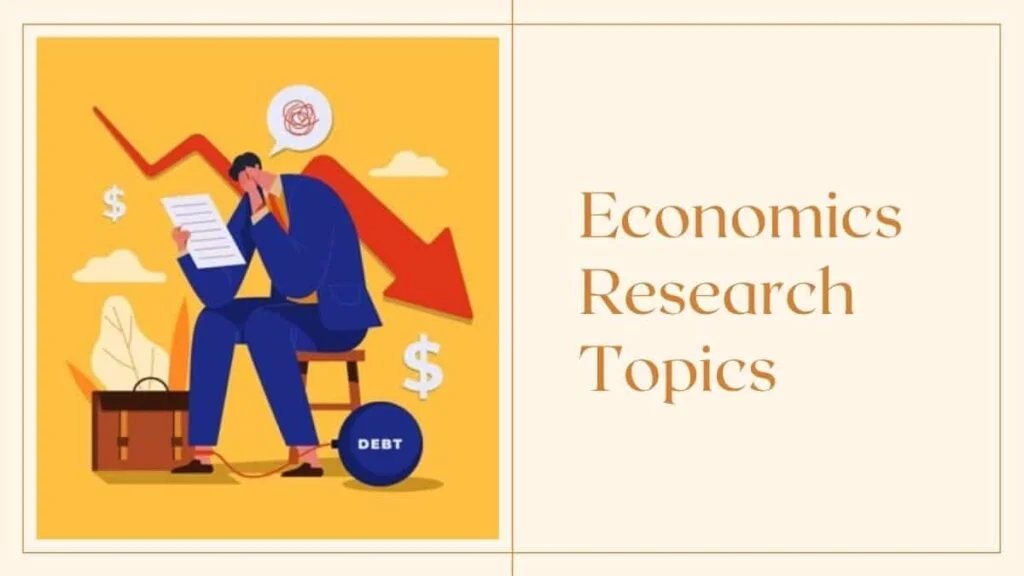
Economics may not always seem easy to all, especially when it is time to choose right economics research topics for a project or writing a master’s thesis. Many diverse aspects have to be taken into consideration while choosing the topic. And yes, sometimes it does get confusing. That is the reason why we are here to help you.
This blog is authored with a view to assist students get through the tough process of choosing the right topic for their economics research.
What is the concept of economics research topics?
Table of Contents
Economics can be defined as a social branch of knowledge. Its study mainly examines the use of scarce natural resources. These resources are used in the process of production, distribution and consumption of goods and services, which are produced in an economy during a particular period of time. This process is continuous.
Before assigning the research papers, students are taught of many elements that affect the economy. This qualifies them to learn real-life economies, day-to-day expenditures as well as expenses. Such basics include elements like medicine, politics, trade, unemployment, poverty, religion, and war with others. Based on these learning’s, they tend to choose economics research topics depending on their area of study.
Tips on how to choose economics research topics
One of the biggest and challenging tasks is to come up with that first lengthy economics research paper. However, in order to name that task, an economics research topic is a must. Picking the best economics research topics is an issue most learners pursuing economics studies come across. Sometimes, learners face difficulties understanding different characteristics of economics research. This is what makes choosing the right and best fitting economics research topics difficult.
Thus, to help the students, this section of the blog contains tips on how to choose the right economics research topics.
Generate interest
Yes! This tip is very important. The topic you choose for the project should absolutely interest you and generate the hunger of curiosity inside you. If the research paper requires you to be working on it for months or even longer. Then it has to be something by which you are thoroughly attracted to. The best way to keep you engaged is to position a question for your paper to which you have always wanted to know the answer. Consider what intriguing economic issues you enjoy discussing or even for a fact, thinking about.
Take inspiration
If one is uncertain where to start from, or have no idea as to what sort of project would be matching up to your course, then it is a wonderful idea to have a look at previous students’ projects. You can grasp inspiration, as a student. Most universities/schools allow its students to access the previous year’s student’s research materials and papers. However, while doing the same, one must make sure to never copy someone else’s idea. You may only look up to them for taking references from their work.
Ask for advice
Once you have collected ideas on the topic for your project, you will perhaps want to ask people who have a certain amount of experience for advice. This tip should be considered before you start your work on the paper. The experienced person or the supervisor should advise you whether the topic chosen by you is the right one. Some basic preparation before the meeting should be done.
Make sure you understand the basic facts of the research area properly. Also, the sub questions and what methods you will be using should be clear for the supervisor to understand. This advice should cover for the rest of the research paper as well. He/she must be able to guide you and correct you wherever necessary.
- How to write essay on Economics
- What is economics and why it is important
- How to get an A+ grade in economics homework
Specific topic
This amazingly useful tip while drafting your research paper advises us to think smaller. If the person is not much acquainted with the economic topic, then it is obvious for that person to not include all the subtleties and complexities it comprises. Be more specific while writing. This will help your project to not only be more manageable, but also that you will actually get to the root of researching for something.
Interdisciplinary topic
If you are in the field of economics but find yourself more absorbed in another academic subject, this may be a golden opportunity to study about that particular field in detail as a part of your research paper. For instance, you could pick a topic which traces itself in a subject like history, sociology, finance, politics, or even psychology. The advantage here is that you can try out acknowledging other information and approaches from another field of study.
It will help you to curate a different project in comparison to most of your fellow classmates as well. This is because they will tend to study a topic which is based purely in the field of economics. It may seem a little harder to acquire information about a different field all together, but we are certain that it will all be worth it at the end of your economics research paper.
Conclusion on how to choose economics research topics
From the above discussion, we are clear about the concept and how to choose economics research topics. With the help of the above mentioned tips, one can now easily pick the right and an equally appropriate topic for their economics research paper.
Economics is the study of how humans utilize scarce resources in the production of goods. Students analyze how these goods and services are eventually distributed globally after production. Because of the vast field, they sometimes find it difficult to find suitable economics research topics. and also get the best economics assignments from our economics assignment helper .
Frequently Asked Questions (FAQ’s)
What is the concept of economics.
Economics is a social branch of knowledge. It determines how rare natural resources are allotted for the purpose of production, distribution and consumption of goods that are produced in a country within a stipulated period of time.
Why is it difficult for students to choose suitable economics research topics for their papers?
Owing to the vast as well as complex sea of knowledge in the field of economics, it sometimes becomes difficult for students pursuing economics studies to choose the right economic research topic for their papers.
What are the tips mentioned in order to choose the right economic research topics?
Tips mentioned in the blog above are all very useful. Generating interest and curiosity among the writer, taking inspiration from students, taking advice from supervisors are some of the tips mentioned above.
Related Posts

7+ Tips On How To Get Higher Grades In Exams In 2023
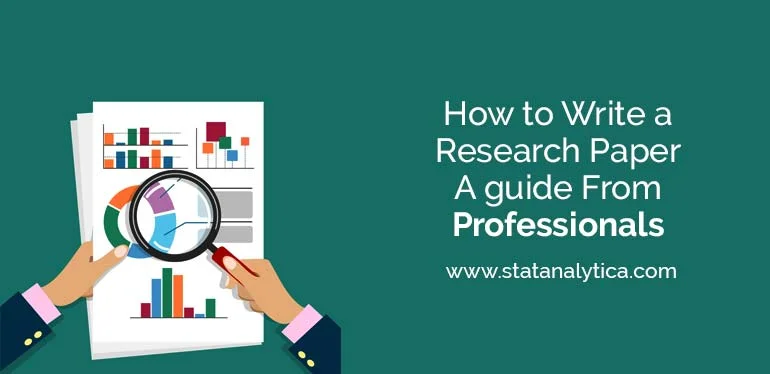
How to Write a Research Paper- A guide From Professionals
ScholarWorks@UMass Amherst
Home > SBS > ECONOMICS > Economics Department Dissertations Collection


Economics Department Dissertations Collection
Current students, please follow this link to submit your dissertation.
Dissertations from 2023 2023
Essays on International Trade and Economic Growth , Mateo Hoyos, Economics
THREE ESSAYS ON MACROECONOMICS AND DEVELOPMENT , Guilherme Klein Martins, Economics
THREE ESSAYS ON ALLOCATION OF COSTS AND BENEFITS, CREDIT, AND TIME , Anamika Sen, Economics
Dissertations from 2022 2022
THREE ESSAYS on GROWTH and DISTRIBUTION in DUAL ECONOMIES , Adam Aboobaker, Economics
WORK, WORKERS, AND REPRODUCING SOCIAL CONTROL: RACIAL POST-FORDISM AND ALTERNATIVE SYSTEMS , Hannah Rebecca Archambault, Economics
Employer Power: Consequences for Wages, Inequality and Spillovers , Ihsaan Bassier, Economics
THREE ESSAYS ON SOCIAL JUSTICE ISSUES: HEALTH, GENDER, AND POLICING , Travis B. Campbell, Economics
CREATION OF ECONOMIC GROWTH AND COMPETITION THROUGH GREEN-INDUSTRIAL POLICIES , Camilo A. Gallego, Economics
Essays on Unpaid Care and Gender Inequality in India , Leila Gautham, Economics
THREE ESSAYS ON TECHNOLOGICAL CHANGE, THE STATE, AND EMPLOYMENT , Baris Guven, Economics
CONSTRAINTS AND ACCOMMODATED PREFERENCE: ESSAYS ON GENDER AND SOCIOECONOMIC INEQUALITY IN PAKISTAN , Sana Khalil, Economics
Essays on Anti-Discrimination Legislation Enforcement and Sex-Based Discrimination in U.S. Labor Markets , Carly McCann, Economics
THREE ESSAYS ON THE POLITICAL ECONOMY OF THE CFA FRANC , Francis Perez, Economics
THREE ESSAYS ON THE POLITICAL ECONOMY OF CULTURAL PRODUCTION AND CREATIVE LABOR , Luke Pretz, Economics
FOUR ESSAYS ON PEACE CONSOLIDATION AND ETHNIC RECONCILIATION IN POSTWAR SRI LANKA , Narayani Sritharan, Economics
The Political Economy of Consumer Credit Expansion and Real Exchange Rate Policy in Dual Economies , Esra Nur Ugurlu, Economics
Dissertations from 2021 2021
Three Essays on Learning and Conflict Applied to Developing Countries , Amal Ahmad, Economics
The Political Economy of the Cost of Foreign Exchange Intervention , Devika Dutt, Economics
CARE WORK IN CHILE’S SEGREGATED CITIES , Manuel Garcia, Economics
ESSAYS ON EXCHANGE RATE SHOCKS AND THE POLITICAL ECONOMY OF LOCAL FISCAL POLICY IN BRAZIL , Raphael Rocha Gouvea, Economics
THREE ESSAYS ON THE POLITICAL ECONOMY OF GLOBAL INACTION ON CLIMATE CHANGE , Tyler A. Hansen, Economics
Three Essays on Socio-Institutional Ecosystems & Labor Structures , Jonathan Donald Jenner, Economics
CONSTRUCTING A MARXIAN INPUT-OUTPUT MODEL CONSIDERING THE TURNOVER OF CAPITAL AND REVISITING THE FALLING-RATE-OF-PROFIT HYPOTHESIS , Junshang Liang, Economics
Three Essays on Structural Change and Labor Market Adjustment in Developing Countries , Karmen Naidoo, Economics
THREE ESSAYS ON EMPLOYMENT IMPACTS OF LABOR MARKET POLICIES , Simon Dominik Sturn, Economics
THREE ESSAYS ON LABOR AND MARRIAGE MARKETS: FARM CRISIS AND RURAL-TO-URBAN MIGRATION IN THE UNITED STATES, 1920-1940 , Jennifer Withrow, Economics
Dissertations from 2020 2020
THREE ESSAYS ON GENDER-SPECIFIC EMPLOYMENT OUTCOMES OF MACROECONOMIC POLICIES , SELIN SECIL AKIN, Economics
A New Economic History of Deindustrialization: Class Conflict and Race in the Motor City , Jackson Allison, Economics
THREE ESSAYS ON MICROECONOMIC ANALYSIS OF POLITICAL ECONOMY: EXPLOITATION, TECHNICAL CHANGE, AND MULTISECTORAL ANALYSIS , Weikai Chen, Economics
Essays on Food Security, Gender and Agriculture , Berna Dogan, Economics
THREE ESSAYS ON THE ECONOMICS OF CORPORATE GOVERNANCE , Kuochih Huang, Economics
THREE ESSAYS ON POLITICAL ECONOMY OF UNEVEN DEVELOPMENT: SPACE, CLASS AND STATE IN PAKISTAN , Danish Khan, Economics
ESSAYS ON WOMEN AND WORK IN INDIA AND ON OTHER-REGARDING PREFERENCES , Sai Madhurika Mamunuru, Economics
THREE ESSAYS ON THE ROLE OF INSTITUTIONS IN INDIAN AGRICULTURE , Kartik Misra, Economics
Neoliberal Capitalism and the Evolution of the U.S. Healthcare System , Samantha Sterba, Economics
THREE ESSAYS ON THE PAST AND FUTURE OF SOCIALISM , Mihnea Tudoreanu, Economics
THREE ESSAYS ON THE ECONOMICS AND POLITICAL ECONOMY OF THE “SCHOOL-TO-PRISON PIPELINE” , Anastasia C. Wilson, Economics
Endogenous Money, Corporate Liquidity Preferences and the Transformation of the U.S. Financial System , Yeo Hyub Yoon, Economics
Dissertations from 2019 2019
The Historical and Legal Creation of a Fissured Workplace: The Case of Franchising , Brian Callaci, Economics
Essays on the Minimum Wage, Immigration, and Privatization , Doruk Cengiz, Economics
Bangladesh's Energy Policy: Economic, Environmental, and Climate Change Impacts , Rohini Kamal, Economics
THREE ESSAYS ON THE POLITICAL ECONOMY OF THE ENVIRONMENT , An Li, Economics
REVISITING THE EAST ASIAN MIRACLE: LABOR REGIMES, PROFITABILITY AND ACCUMULATION , Zhongjin Li, Economics
Dimensions of US Global Financial Power: Essays on Financial Sanctions, Global Imbalances, and Sovereign Default , Mariam Majd, Economics
THE POLITICAL ECONOMY OF ACCUMULATION IN SOUTH AFRICA: Resource Extraction, Financialization, and Capital Flight as Barriers to Investment and Employment Growth , Seeraj Mohamed, Economics
STATE-LOCAL GOVERNMENT SPENDING, MACROECONOMIC FISCAL POLICY, AND THE BUSINESS CYCLE , Amanda Page-Hoongrajok, Economics
Essays on Monetary Policy in Developing Countries: Income Distribution, Housing and Unemployment , Zhandos Ybrayev, Economics
Resource Rents, Public Investment and Economic Development: The Case of Bolivia , Raul Zelada Aprili, Economics
Dissertations from 2018 2018
Three Essays on Governments and Financial Crises in Developing Economies, 1870-1913 , Peter H. Bent, Economics
Constraining Labor's “Double Freedom”: Revisiting the Impact of Wrongful Discharge Laws on Labor Markets, 1979-2014 , Eric Hoyt, Economics
SOCIAL STRUCTURE OF ACCUMULATION IN TURKEY (1963 – 2015) , Osman C. Icoz, Economics
Stumbling Toward the Up Escalator: How Trends in International Trade, Investment, and Finance Have Complicated Latin America’s Quest for Sustainable, Diversified Economic Development , Mary Eliza Rebecca Ray, Economics
Forms of Naturalism in Seminal Neoclassical Texts: An Analysis and Comparison of Léon Walras, John Bates Clark, and William Stanley Jevons , Mark Silverman, Economics
THREE ESSAYS ON CHILD WELFARE IN CÔTE D’IVOIRE , Didier Wayoro, Economics
Dissertations from 2017 2017
Currency Mismatch and Balance Sheet Effects of Exchange Rate in Turkish Non-Financial Corporations , Serkan Demirkilic, Economics
The Impacts of Foreign Labor Migration of Men on Women's Empowerment in Nepal , Pratistha Joshi Rajkarnikar, Economics
Real and Nominal Effects of Exchange Rate Regimes , Emiliano Libman, Economics
Three Essays on International Economics and Finance , Juan Antonio Montecino, Economics
THREE ESSAYS ON “DOING CARE”, GENDER DIFFERENCES IN THE WORK DAY, AND WOMEN’S CARE WORK IN THE HOUSEHOLD , Avanti Mukherjee, Economics
Dissertations from 2016 2016
Colonial and Post-Colonial Origins of Agrarian Development: The Case of Two Punjabs , Shahram Azhar, Economics
Three Essays on the Social Determinants of Early Childhood Health and Development , Andrew Barenberg, Economics
ELITE CAPTURE, FREE RIDING, AND PROJECT DESIGN: A CASE STUDY OF A COMMUNITY-DRIVEN DEVELOPMENT PROJECT IN CEARÁ, BRAZIL , Jessica Carrick-Hagenbarth, Economics
Three Essays on Sustainable Development in China: Social, Economic and Environmental Aspects , Ying Chen, Economics
Three Essays on Women's Land Rights in Rural Peru , Rosa L. Duran, Economics
Three Essays on Economic Stages and Transition , Ricardo R. Fuentes-Ramírez, Economics
Three Essays on U.S. Household Debt and the Sources of Systemic Financial Fragility , Thomas Herndon, Economics
Essays on Household Health Expenditures, National Health Insurance and Universal Access to Health Care in Ghana , EVELYN KWAKYE, Economics
Microfinance, Household Indebtedness and Gender Inequality , Theresa Mannah-Blankson, Economics
Three Essays on Labor Market Friction and the Business Cycle , Jong-seok Oh, Economics
Three Essays on Sustainability , Mark V. Paul, Economics
The Political Economy of Smallholder Incorporation and Land Acquisition , Alfredo R. Rosete, Economics
Employment and Family Leave Mandates: Three Essays on Labor Supply and Demand, Nontraditional Families, and Family Policy , Samantha Schenck, Economics
Endogenous Capacity, Multiple Equilibria and Thirlwall's Law: Theory and an Empirical Application to Mexico: 1950 - 2012. , Juan Alberto Vázquez Muñoz, Economics
Three Essays on the Macroeconomic Impacts of Rent Seeking , Kurt von Seekamm, Economics
Dissertations from 2015 2015
Essays on Growth Complementarity Between Agriculture and Industry in Developing Countries , Joao Paulo de Souza, Economics
Structural Transformation, Culture, and Women’s Labor Force Participation in Turkey , yasemin dildar, Economics
Essays on Information, Income, and the Sharing Economy , Anders F. Fremstad, Economics
Essays on Inequality, Credit Constraints, and Growth in Contemporary Mexico , Leopoldo Gómez-Ramírez, Economics
Three Essays on Macroeconomic Implications of Contemporary Financial Intermediation , Hyun Woong Park, Economics
The Labor Share Question in China , Hao Qi, Economics
Three essays on economic inequality and environmental degradation , Klara Zwickl, Economics
Dissertations from 2014 2014
Common Pool Resources and Rural Livelihoods in Stung Treng Province of Cambodia , Pitchaya Boonsrirat, Economics
The financialization of the nonfinancial corporation in the post-1970 U.S. economy , Leila Emami Davis, Economics
The Financial Underpinnings of the EU Crisis: Financial Deregulation, Privatization, and Asymmetric State Power , Nina Q. Eichacker, Economics
THE FINANCIAL SECTOR AND INCLUSIVE DEVELOPMENT IN AFRICA: ESSAYS ON ACCESS TO FINANCE FOR SMALL AND MEDIUM-SIZED ENTERPRISES IN SOUTH SUDAN AND KENYA , James A. Garang, Economics
OUTPUT FLUCTUATIONS AND ECONOMIC GROWTH IN LATIN AMERICA IN THE AFTERMATH OF THE GREAT RECESSION , Gonzalo Hernandez Jimenez, Economics
TEMPORARY EMPLOYMENT AND EARNINGS INEQUALITY IN SOUTH KOREA , Hyeon-Kyeong Kim, Economics
Three Essays in Macroeconomic History , Joshua W. Mason, Economics
Essays on the Evolution of Inequality , Cem Oyvat, Economics
FINANCIALIZATION OF THE COMMODITIES FUTURES MARKETS AND ITS EFFECTS ON PRICES , Manisha Pradhananga, Economics
Productive Stagnation and Unproductive Accumulation in the United States, 1947-2011. , Tomas N. Rotta, Economics
Advertising and the Creation of Exchange Value , Zoe Sherman, Economics
Understanding Income Inequality in the United States , Mark J. Stelzner, Economics
CARE TIME IN THE U.S.: MEASURES, DETERMINANTS, AND IMPLICATIONS , Joo Yeoun Suh, Economics
Essays on the minimum wage , Ben Zipperer, Economics
Dissertations from 2013 2013
Credit Chains, Credit Bubles, and Financial Fragility: Explaining The U.S. Financial Crisis of 2007-09 , Thomas L Bernardin, Economics
A Knife Hidden in Roses: Development and Gender Violence in the Dominican Republic , Cruz Caridad Bueno, Economics
Sustaining Rural Livelihoods in Upper Svaneti, Republic of Georgia , Robin J Kemkes, Economics
Contract as Contested Terrain: An Economic History of Law and the Rise of American Capitalism , Daniel P MacDonald, Economics
Essays on the Rising Demand for Convenience in Meal Provisioning in the United States , Tamara Ohler, Economics
Social Emulation, the Evolution of Gender Norms, and Intergenerational Transfers: Three Essays on the Economics of Social Interactions , Seung-Yun Oh, Economics
Decollectivization and Rural Poverty in Post-Mao China: A Critique of the Conventional Wisdom , Zhaochang Peng, Economics
Capitalist Crisis and Capitalist Reaction: The Profit Squeeze, the Business Roundtable, and the Capitalist Class Mobilization of the 1970s , Alejandro Reuss, Economics
The Economics of Same-Sex Couple Households: Essays on Work, Wages, and Poverty , Alyssa Schneebaum, Economics
The Political Economy of Cultural Production: Essays on Music and Class , Ian J. Seda Irizarry, Economics
Essays Of Human Capital Formation , Owen Thompson, Economics
Dissertations from 2012 2012
Knowledge, Gender, and Production Relations in India's Informal Economy , Amit Basole, Economics
Macroeconomic and Microeconomic Determinants of Informal Employment: The Case of Clothing Traders in Johannesburg, South Africa , Jennifer E Cohen, Economics
The Relationship Between Mass Incarceration and Crime in the Neoliberal Period in the United States , Geert Leo Dhondt, Economics
Fair Trade, Agrarian Cooperatives, and Rural Livelihoods in Peru , Noah Enelow, Economics
Organic Farming and Rural Transformations in the European Union: A Political Economy approach , Charalampos Konstantinidis, Economics
The Sources of Financial Profit: A Theoretical and Empirical Investigation of the Transformation of Banking in the US , Iren G. Levina, Economics
A Minskian Approach to Financial Crises with a Behavioural Twist: A Reappraisal of the 2000-2001 Financial Crisis in Turkey , Mathieu Perron-Dufour, Economics
Essays on Urban Sprawl, Race, and Ethnicity , Jared M. Ragusett, Economics
Agriculture and Class: Contradictions of Midwestern Family Farms Across the Twentieth Century , Elizabeth Ann Ramey, Economics
Women In Conflict, Peacebuilding And Reconstruction: Insights From The Aftermath Of Nepal's Maoist Insurgency , Smita Ramnarain, Economics
Money, Reality, and Value: Non-Commodity Money in Marxian Political Economy , Joseph Thomas Rebello, Economics
Three essays on oil scarcity, global warming and energy prices , Matthew Riddle, Economics
The Political Economy of Agrarian Change in the People's Republic of China , Zhun Xu, Economics
Dissertations from 2011 2011
State Hegemony and Sustainable Development: A Political Economy Analysis of Two Local Experiences in Turkey , Bengi Akbulut, Economics
Financial evolution and the declining effectiveness of US monetary policy since the 1980s , Hasan Comert
Why China Grew: Understanding the Financial Structure of Late Development , Adam S. Hersh, Economics
Solving the "Coffee Paradox": Understanding Ethiopia's Coffee Cooperatives Through Elinor Ostrom's Theory of the Commons , Susan Ruth Holmberg, Economics
Migration, Remittances And Intra-Household Allocation In Northern Ghana: Does Gender Matter? , Lynda Joyce Pickbourn, Economics
Youth and Economic Development: A Case Study of Out-of-School Time Programs for Low-Income Youth in New York State , Kristen Maeve Powlick, Economics
The Real Exchange Rate And Economic Development , Martin Rapetti, Economics
Essays on International Reserve Accumulation and Cooperation in Latin America , Luis Daniel Rosero, Economics
Three Essays on Racial Disparities in Infant Health and Air Pollution Exposure , Helen Scharber, Economics
Dissertations from 2010 2010
Capitalism in Post-Colonial India: Primative Accumulation Under Dirigiste and Laissez Faire Regimes , Rajesh Bhattacharya, Economics
Uneven Development and the Terms of Trade: A Theoretical and Empirical Analysis , Bilge Erten, Economics
Gendered Vulnerabilities After Genocide: Three Essays on Post-Conflict Rwanda , Catherine Ruth Finnoff, Economics
The Employment Impacts of Economy-wide Investments in Renewable Energy and Energy Efficiency , Heidi Garrett-Peltier, Economics
Household Employer Payroll Tax Evasion: An Exploration Based on IRS Data and on Interviews with Employers and Domestic Workers , Catherine B. Haskins, Economics
Racial Inequality and Affirmative Action in Malaysia and South Africa , Hwok-Aun Lee, Economics
Essays on Behavioral Labor Economics , Philip Pablo Mellizo, Economics
Three Essays on the Political Economy of Live Stock Sector in Turkey , Hasan Tekguc, Economics
The Impact Of Public Employment On Health , Wei Zhang, Economics
Dissertations from 2009 2009
Effort, work hours, and income inequality: Three essays on the behavioral effects of wage inequality , Michael Carr
Essays on investment, real exchange rate, and central bank in a financially liberalized Turkey , Deger Eryar
Essays On Investment, Real Exchange Rate, And Central Bank In A Financially Liberalized Turkey , Deger Eryar, Economics
Labor Turnover in the Child-Care Industry: Voice and Exit , Lynn A. Hatch, Economics
Three Essays on Conflict and Cooperation , Sungha Hwang, Economics
Economic Reforms in East African Countries: The Impact on Government Revenue and Public Investment , Adam Beni Swebe Mwakalobo, Economics
Post-Marxism After Althusser: A Critique Of The Alternatives , Ceren Ozselcuk, Economics
Essays on Financial Behavior and its Macroeconomic Causes and Implications , Soon Ryoo, Economics
Skill Mismatch and Wage Inequality in the U.S. , Fabian Slonimczyk, Economics
Linkages Between Inequality And Environmental Degradation: An Interregional Perspective , Marina S Vornovytskyy, Economics
Dissertations from 2008 2008
Migrant women and economic justice: A *class analysis of Anatolian -German women in homemaking and cleaning services , Esra Erdem
Emigrant or sojourner? The determinants of Mexican labor migration strategies to the United States , Florian K Kaufmann
Macrofinancial risk management in the U.S. economy: Regulation, derivatives, and liquidity preference , Marcelo Milan
Essays on behavioral economics , Wesley Jose Pech
The impact of land ownership inequality on rural factor markets , Fatma Gul Unal
Three essays on family care, time allocation, and economic well -being , Jayoung Yoon
Dissertations from 2007 2007
Capital flight and foreign direct investment in the Middle East and North Africa: Comparative development and institutional analysis , Abdullah Almounsor
Investment under financial liberalization: Channels of liquidity and uncertainty , Armagan Gezici
Three essays on social dilemmas with heterogeneous agents , Mark Howard
Between the market and the milpa: Market engagements, peasant livelihood strategies, and the on -farm conservation of crop genetic diversity in the Guatemalan highlands , S. Ryan Isakson
Late neoclassical economics: Restoration of theoretical humanism in contemporary mainstream economics , Yahya Mete Madra
Inequality and the Human Development Index , Elizabeth Anne Stanton
Dissertations from 2006 2006
Institutional settings and organizational forms: Three essays , Alper Duman
Labor market characteristics and the determinants of political support for social insurance , Anil Duman
State power, world trade, and the class structure of a nation: An overdeterminist class theory of national tariff policy , Erik E Guzik
Unions and the strategy of class transformation: The case of the Broadway musicians , Catherine P Mulder
Children's work and opportunities for education: Consequences of gender and household wealth , Sevinc Rende
The economics of immigration: Household and employment dynamics , Maliha Safri
Dissertations from 2005 2005
Capital flight from Southeast Asia: Case studies on Indonesia, Malaysia, the Philippines, and Thailand , Edsel L. Beja
Rethinking municipal privatization: A Marxian class analysis of the privatization of New York City's Central Park , Oliver David Cooke
Financial liberalization and its distributional consequences: An empirical exploration , Arjun Jayadev
Three essays on gender, land rights, and collective action in Brazil's rural political economy , Merrilee Mardon
Land markets, female land rights and agricultural productivity in Paraguayan agriculture , Thomas Masterson
Workers' struggles and transformations of capitalism at industrial enterprises in Russia, 1985–2000 , Maxim V Maximov
Economy and society: Class relations and the process of economic growth , Erik K Olsen
Gender, liberalization and agrarian change in Telangana , Smriti Rao
The contradictory imperatives of New Deal banking reforms. , Ellen D. Russell, Economics
Equity in community -based sustainable development: A case study in western India , Priya Parvathy Sangameswaran
Mandated wage floors and the wage structure: Analyzing the ripple effects of minimum and prevailing wage laws , Jeannette Wicks-Lim
Public enterprises in mixed economies: Their impact on economic growth and social equity , Andong Zhu
Dissertations from 2004 2004
An economic analysis of prison labor in the United States , Asatar P Bair
Three essays on income, inequality and environmental degradation , Rachel A Bouvier
The implementation and enforcement of environmental regulations in a less developed market economy: Evidence from Uruguay , Marcelo F Caffera
Race, altruism and trust: Experimental evidence from South Africa , Justine Claire Keswell
Exchanging entailments: The contested meaning of commodity exchange , Philip M Kozel
Three essays on capital account liberalization and economic growth: New measures, new estimates and the experience of South Korea , Kang-Kook Lee
Enterprise hybrids and alternative growth dynamics , Kenneth M Levin
Social interaction and economic institution , Yongjin Park
Research and policy considerations in the valuation and the allocation of environmental and health commodities , Mihail Samnaliev
Immiserizing growth: Globalization and agrarian change in Telangana, South India between 1985 and 2000 , Vamsicharan Vakulabharanam
Social networks and labor market outcomes: Theoretical expansions and econometric analysis , Russell E Williams
Dissertations from 2003 2003
Three essays on the evolution of cooperation , Jung-Kyoo Choi
Economic size and long -term growth: An empirical analysis of the consequences of small economic size on investment, productivity and income growth , Pavel E Isa
Essays on categorical inequality, non-linear income dynamics and social mobility in South Africa , Malcolm M Keswell
The effectiveness of tax incentives in attracting investment: The case of Puerto Rico , Carlos F Liard-Muriente
A theoretical and statistical exploration into the effects of morals, personality and uncertainty on hypothetical bias in contingent valuation , Joseph D Ogrodowczyk
The role of the stock market in influencing firm investment in China , Feng Xiao
Dissertations from 2002 2002
Essays on the threat effects of foreign direct investment on labor markets , Minsik Choi
An international analysis of child welfare , Nasrin Dalirazar
Fiscal faux pas? An empirical analysis of the revenue and expenditure implications of trade liberalization , Barsha Khattry
Property from the sky: The creation of property rights in the radio spectrum in the United States , Elizabeth M Kruse
Three essays on China's state owned enterprises: Towards an alternative to privatization , Minqi Li
From welfare rights to welfare fights: Neo -liberalism and the retrenchment of social provision , John Arthur O'Connor
Political community and individual gain: Aristotle, Adam Smith and the problem of exchange , Kimberly Kaethe Sims
Rethinking prostitution: Analyzing an informal sector industry , Marjolein Katrien van der Veen
Dissertations from 2001 2001
Land and labor markets among paddy producers in the Nepalese Tarai , Ravi Bhandari
What drives equity values: fundamentals or net flows? An empircal analysis of the 1982--1999 United States stock market boom , Lawrence Lee Evans
Investment, labor demand, and political conflict in South Africa , James S Heintz
Education, Inequality and Economic Mobility in South Africa , Thomas Nathaniel Hertz
Employer work -family programs: Essays on policy implementation, employee preferences, and parental childcare choices , Sally Jane Kiser
Valuing environmental health risks: A comparison of stated preference techniques applied to groundwater contamination , Tammy Barlow McDonald
Endogenous quality and intra-industry trade , Edward Allan McPhail
Perceptions of Massachusetts family and consumer sciences education professionals regarding the importance and use of the National Standards for Family and Consumer Sciences Education in Massachusetts , Jo Ann Pullen
From feudal serfs to independent contractors: Class and African American women's paid domestic labor, 1863–1980 , Cecilia M Rio
A home of one's own: Overcoming gender and familial status barriers to homeownership , Judith K Robinson
Springfield Armory as industrial policy: Interchangeable parts and the precision corridor , Bruce K Tull
Dissertations from 2000 2000
Intergroup inequality, social identity and economic outcomes , Katherine E Baird
Engendering Globalization: Household Structures, Female Labor Supply and Economic Growth , Elissa Braunstein
Capital, conditionality, and free markets: The International Monetary Fund, the World Bank, and the effects of the neoliberal transformation in Latin America and the Caribbean , Andres Carbacho-Burgos
Rural institutions, poverty and cooperation: Learning from experiments and conjoint analysis in the field , Juan-Camilo Cardenas
Understanding the equal split as a bargaining convention and the role of residual claimancy in team production: Three essays in behavioral and experimental economics , Jeffrey Paul Carpenter
Enforcing market -based environmental policies , Carlos A Chavez Rebolledo
A comparative analysis of three economic theories focusing upon the international trade of hazardous waste (the case of electric arc furnace dust) , Amy Silverstein Cramer
The political economy of transformation in Hungary , Anita Dancs
Cross -media transfers of pollution and risk , Janine Marie Dombrowski
Essays on endogenous preferences and public generosity , Christina Margareta Fong
Con nuestro trabajo y sudor: Indigenous women and the construction of colonial society in 16th and 17th century Peru , Karen B Graubart
Banks, insider lending and industries of the Connecticut River Valley of Massachusetts, 1813–1860 , Paul Andre Lockard
Existence value: A reappraisal and cross -cultural comparison , Billy Manoka
Quality management systems and the estimation of market power exertion , Corinna Michaela Noelke
The power of personality: Labor market rewards and the transmission of earnings , Melissa Anne Osborne
Accumulation and European unemployment , Engelbert Richard Stockhammer
Modeling Superfund: A hazardous waste bargaining model with rational threats , Mary Anderson Taft
Welfare, inequality, and resource depletion: A reassessment of Brazilian economic growth, 1965–1993 , Mariano Torras
Dissertations from 1999 1999
Steadying the husband, uplifting the race: The Pittsburgh Urban League's promotion of black female domesticity during the Great Black Migration , Nina Elizabeth Banks
The origins of parallel segmented labor and product markets: A reciprocity-based agency model with an application to motor freight , Stephen V Burks
R&D, advertising, and profits: Economic theory, empirical evidence, and consequences for transfer pricing policy , David W DeRamus
Rethinking demand: A critique and reformulation of Marxian theories of price , David Leo Kristjanson
Wealth, the power to set terms, and the financing and control of firms , Paul N Malherbe
Intra -family transfers and the household division of labor: A case study of migration and remittance behavior in South Africa , Dorrit Ruth Posel
Transportation network policy modeling for congestion and pollution control: A variational inequality approach , Padma Ramanujam
The political economy of organized baseball: Analysis of a unique industry , Ross David Weiner
Dissertations from 1998 1998
The internationalization of production and its effects on the domestic behavior of United States manufacturing multinational firms , James Michael Burke
Neoliberal and neostructuralist theories of competitiveness and flexible labor: The case of Chile's manufactured exports, 1973-1996 , Fernando Ignacio Leiva
An econometric study of the export sector of Somalia , Mohamed A Osman
Financial liberalization, multinational banks and investment: Three essays on the cases of Hungary and Poland , Christian Erik Weller
Dissertations from 1997 1997
Structuralism and individualism in economic analysis: The "contractionary devaluation debate" in development economics , S Charusheela
Financial liberalization in Mexico, 1989-1993 , Colin Danby
CEO pay, agency, and the theory of the firm , Frederick Dexter Guy
Food quality regulation under trade agreements: Effects on the supply of food safety and competitiveness , Neal Hilton Hooker
Agency problems in the capital markets and the employment relationship: The possibility of efficiency-enhancing institutional innovation: An empirical case-study , Pierre Laliberte
New directions in the political economy of consumption , Allan Henry MacNeill
Capabilities and processes of industrial growth: The case of Argentina and the Argentine auto industry , Marcela Monica Miozzo
Manufacturers' responses to new nutrition labeling regulations , Eliza Maria Mojduszka
Rethinking rural development: Making peasant organizations work. The case of Paraguay , Jose R Molinas Vega
Property regimes, technology, and environmental degradation in Cuban agriculture , Hector R Saez
International multi-sector, multi-instrument financial modeling and computation: Statics and dynamics , Stavros Siokos
Three essays on government decision-making to implement and enforce environmental policies , Kristin Ellen Skrabis
Dissertations from 1996 1996
An economic critique of urban planning and the 'postmodern' city: Los Angeles , Enid Arvidson
Dissertations from 1995 1995
Trade liberalization and income distribution: Three essays with reference to the case of Mexico and the North American Free Trade Agreement (NAFTA) , Mehrene E Larudee
Dissertations from 1994 1994
Subjectivism and the limits of F. A. Hayek's political economy , Theodore A Burczak
International currencies and endogenous enforcement , Roohi Prem
Three essays on key currencies and currency blocs , Ellen Tierney
Dissertations from 1993 1993
Capitalist regulation and unequal integration: The case of Puerto Rico , Jaime Eduardo Benson
Production and reproduction: Family policy and gender inequality in East and West Germany , Lynn Susan Duggan
Dissertations from 1992 1992
Capital controls and long-term economic growth , Jessica G Nembhard
Dissertations from 1990 1990
Concentration and product diversity in culture-based industries: A case study of the music recording industry , Peter James Alexander
Dissertations from 1987 1987
THE DETERMINANTS OF THE ECONOMIC POLICIES OF STATES IN THE THIRD WORLD: THE AGRARIAN POLICIES OF THE ETHIOPIAN STATE, 1941-1974 , HENOCK KIFLE
Dissertations from 1986 1986
The Political-Economy of Nuclear Power 1946-1982 , Steven Mark Cohn, Economics
Dissertations from 1985 1985
THE IMPACT OF PUBLIC SECTOR EMPLOYMENT ON RACIAL INEQUALITY: 1950 TO 1984 (BLACK, AFFIRMATIVE ACTION, GOVERNMENT, UNEMPLOYMENT, LABOR) , PETER GEORGE BOHMER
THE GROWTH OF NONMARRIAGE AMONG U.S. WOMEN, 1954-1983 (MARRIAGE, FAMILY, HOUSEHOLDS, UNITED STATES) , ELAINE DENISE MCCRATE
Dissertations from 1983 1983
TAXATION AND PUBLIC SCHOOL FINANCE REFORM IN CONNECTICUT , MICHAEL ROBERT FEDEROW
Dissertations from 1982 1982
Evolution of a Hospital Labor System: Technology, Coercion, and Conflict , Jean E. Fisher, Economics
Dissertations from 1981 1981
THE DEVELOPMENT OF THE MARKET ECONOMY IN COLONIAL MASSACHUSETTS , RONA STEPHANIE WEISS
Dissertations from 1980 1980
Justice and economic theory. , Barry Stewart Clark, Economics
Dissertations from 1976 1976
EVALUATION OF NEOCLASSICAL THEORY OF PRICE, PRODUCTION AND THE DISTRIBUTION OF INCOME. , MANUCHER DARESHURI
Dissertations from 1970 1970
COST PROBLEMS OF THE RUTLAND RAILROAD AND ITS SUCCESSORS FROM--1937 TO 1968 , ROBERT DAVID SMITH
Advanced Search
- Notify me via email or RSS
- Collections
- Disciplines
Author Corner
- Login for Faculty Authors
- Faculty Author Gallery
- Expert Gallery
- University Libraries
- UMass Amherst
This page is sponsored by the University Libraries.
© 2009 University of Massachusetts Amherst • Site Policies
Privacy Copyright
130 Excellent Economics Research Topics To Consider
Table of Contents
Are you an economics student searching for good topics for your research paper? If yes, then keep on reading this blog. To make the topic selection process easier for you, here we have suggested a list of the best economics research topics on various areas associated with the subject. In addition to that, we have also presented a brief overview of economics research paper topic selection and writing.
Quickly explore the entire list and choose any ideal topic for composing your economics thesis or dissertation.
Economics Research Paper Topic Selection and Writing
Have your professor asked you to submit an economics research paper? If yes, then topic selection is the first step you should do. In case, your supervisors had not suggested any research ideas, make sure to choose a unique economics research topic that you are interested in. The topic you choose should be understandable for you and your readers, and it should also have a wide research scope with the necessary information for crafting a comprehensive research paper or essay.
After you have selected a research topic for your economics assignment, sketch an outline with the research ideas that you have gathered. Then, with the help of the essay outline you have prepared, draft the research paper in a well-structured manner by including the essential elements such as the introduction, body, and conclusion.
The introduction paragraph of your research paper should have a catchy opening sentence, brief background information on the topic, and a strong thesis statement addressing the purpose of your research paper. After the introduction, in the body paragraphs, you should include innovative topic sentences and explain your arguments with supporting evidence in a way to persuade your reader. Then, you should finally close your research paper with an engaging conclusion that contains a brief summary of the main points.
List of the Best Economics Research Paper Topics
You may think that it is easy to choose a research topic for your economics research paper. But actually, it is not. As economics is a complex and broad subject, choosing a perfect research topic from it is a daunting task.
If you are asked to write an economics research paper or essay, then you can prefer to choose a topic from economics research areas such as macroeconomics, microeconomics, behavioral economics, agricultural economics, development economics, financial economics, and so on.
Here, we have sorted different categories of economics topics and have recommended a list of excellent economics research topic ideas for you to consider. Go through the entire list and pick a topic that is ideal for writing academic papers as per your instructor’s requirements.
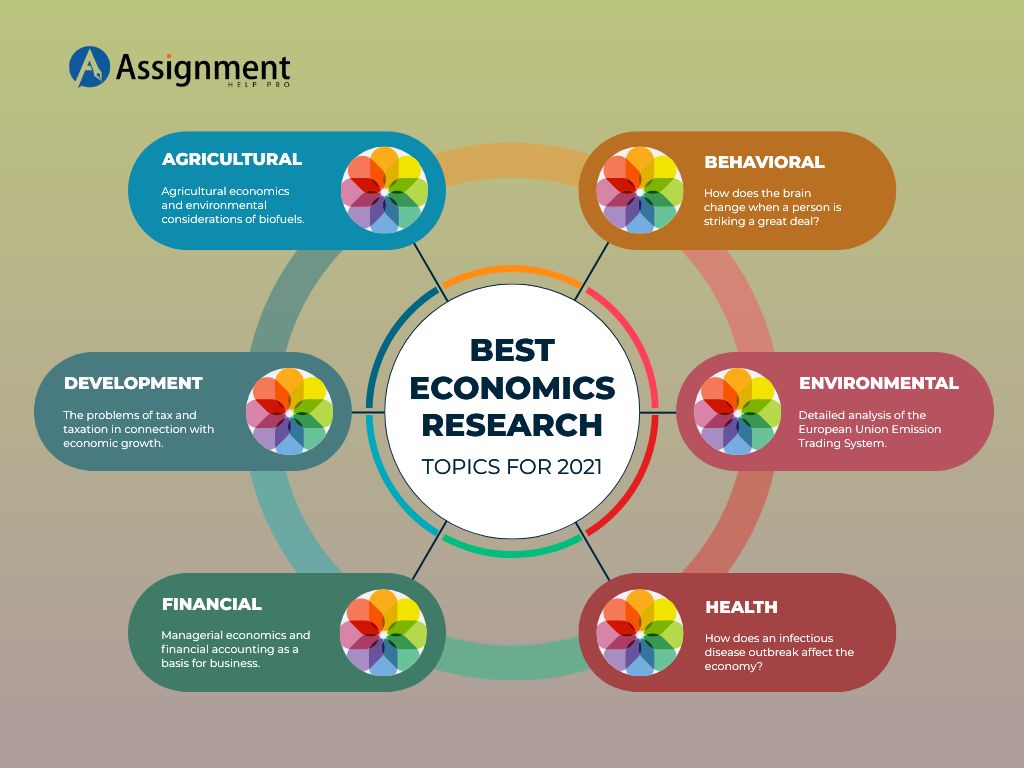
Agricultural Economics Research Topics
- Farmer’s contribution to agricultural social capital.
- Agricultural economics and agribusiness.
- An analysis of economic efficiency in agriculture.
- Agricultural and resource economics.
- Agricultural economics and environmental considerations of biofuels.
- Analysis of food security and poverty status among households in Ehime Mbano
- Role of bank loans and credit facility in financing Nigerian agriculture sector: a case study of Nigeria agricultural cooperative and rural development bank
- Evaluation of the impact of micro-finance banks on the South African agriculture sector
- How poultry farming is becoming a veritable tool for the economic empowerment of South Africa?
- Critical analysis of the problems and prospects of agriculture financing in rural India
Behavioral Economics Research Paper Topics
- What does the economy of trust mean?
- How does the brain change when a person is striking a great deal?
- The impact of economic stability on the social life of a person
- The buying capacity and gender
- How does race relate to economic power?
- Big data and its implications for behavioral economics
- The impact of behavioral finance on investment decisions.
- Cognitive and behavioral theories in economics.
- Behavior implications of wealth and inequality.
- Using behavioral economics to help in reducing substance abuse
Development Economics Research Topics
- The relation between development and incentive for migration.
- The economic consequences of population growth in developing countries.
- The determinants of high-performing institutions in emerging economies
- The impact of globalization on income distribution in emerging economies
- The problems of tax and taxation in connection with economic growth.
- The economic impact of terrorism on developing markets.
- Investigate the relationship between family planning, labor force, and income fluctuations.
- The impact of natural disasters on the economy and political stability of emerging markets.
- Budgeting and decision-making by low-income earners in emerging economics
- The impact of multinational commodity trading through the development of economic perspective.
- Compare and contrast the impact of demand-pull inflation and cost-push inflation on a country’s economy
- Discuss the impact of multinational commodity trading through the perspective of development economics
- Discuss the concepts of mercantilism, linear stages of growth model, economic nationalism, and structural-change theory
- Investigate the relationship between unemployment and fluctuations in national income
- Compare and contrast the economic patterns of villages across Papua New Guinea
Environmental Economics Research Paper Topics
- Explain the energy markets’ economic potential.
- How does global warming affect economic growth?
- How technological advancement leads to economic growth
- Evolution of economic institutions concerning climate change
- Cost-benefit analysis of the regulation of the environment
- The economic perspectives of the distribution of natural resources across boundaries
- The relationship between financial subsidies and the generation of eco-friendly products
- Detailed analysis of the European Union Emission Trading System
- Why it’s important to analyze the economics of clean drinking water
- How wildlife protection affects the economy
Read more: Outstanding Environmental Science Topics for You to Consider
Financial Economics Research Topics
- Risk-taking by mutual funds as a response to incentives.
- Financial economics for infrastructure and fiscal policy.
- Managerial economics and financial accounting as a basis for business
- The analysis of the global financial crisis of 2020
- Stock market overreaction.
Health Economics Research Ideas
- How do chronic diseases affect the workforce and the economy?
- How can public hospitals optimize their revenue collection?
- The economics of the pharmaceutical industry
- How an unhealthy country translates into a poor country
- Is the world’s hunger affected by economics?
- How does perfect competition work in the pharmaceutical world?
- How does an infectious disease outbreak affect the economy?
- Is health insurance important?
- How is the economy affected by a smoking ban?
Research Paper Topics on International Trade
- What are the gains and losses of international trade for developing countries?
- The importance of international trade in developing countries
- The relationship between economic growth and international trade
- The impact of Brexit on small and middle businesses in the UK
- To what extent does a currency union affect trade?
- The roles of exchange rate and exchange rate regime in the US export.
- To what extent are the gains of less developed countries from trade liberalization exaggerated?
- Foreign direct investment in the United States: Determinants and impact
- The relationship between foreign direct investment and wages
- The effects of the banana crisis on the Jamaican and British economies
Macroeconomics Research Topics
- Global recession and factors that contribute to it.
- The relationship between Internet connectivity and productivity in the workplace.
- The relationship between economic growth and unemployment in your country.
- Income Dynamics and demographic economics.
- What should our government do to minimize the risks of future default?
- The connection between politics and economics.
- The world problems through macroeconomic analysis .
- US Market Liquidity and Macroeconomics.
- The structure, history, and activities of the World Bank.
- Economics of education in developing markets.
- Public policies and socio-economic disparities.
- Banks and their role in the economy.
- Problems and possible solutions for Japan macroeconomics.
- State regulation of the economy in foreign countries: main models of regulation.
- The effect of currency devaluation on small and medium firms
- A comparison of the United States unemployment to the rest of the world
- The relationship between common stock prices and inflation in your country.
- Macroeconomics and self-correction of the economy.
- Analysis of Africa’s macroeconomics and its performance.
- The implications of Internet banking on bank profitability.
Read more: Best Macroeconomics Research Topics and Ideas for Students
Microeconomics Research Topics
- Explain how competition influences the price.
- Opportunity costs explained from a microeconomics perspective
- Inflation sources and consequences explained
- The impact of demonetization on small and medium businesses
- The connection between the minimum wage and market equilibrium.
- Perfect competition in microeconomics
- Theories in microeconomics
- The effect of labor force participation on the economy and budget
- Economic inequality as a result of globalization.
- Explain the balance between supply and demand in microeconomics
- Dynamics of the Gini index as a reflection of the problem of inequality in income
- Privatization of Public Enterprises and its implications on economic policy and development
- How does the stock market work?
- The impact of game theory on economic development.
- The changes in oil prices: causes and solutions.
- Marketing uses in microeconomics.
- The economic explanation of political dishonesty.
- How company mergers and dissolutions impact the economy
- The role of tax collection agencies in microeconomics
- Different microeconomic models and how they face the effect of industry conditions
A Few More Microeconomics Research Ideas
- How exactly does Uber fit into the economy of trust?
- How does a person’s brain alter when they hit a big deal?
- missing practical human insights from big data and how this affects the economy.
- explaining how supply and demand are balanced in microeconomics
- Changes in economic institutions with regard to climate change
- Effects of greenhouses on economic growth
- Effects of climate change on economic growth
- Analysis of the European Union Emission Trading System in great detail
- Is resource management for waste scarce? A microeconomics explanation of opportunity costs
- Effects of wildlife protection on the economy
Interesting Economics Research Topics
- What role does entrepreneurship play in economic development?
- How do automation and artificial intelligence affect the labor market?
- Discuss the Economics of healthcare systems and policies in developing countries.
- Explain the effects of trade agreements on income distribution.
- How does foreign aid affect economic development?
- Explain the impact of monetary policy on financial markets and inflation.
- Discuss the effects of income inequality on social mobility.
- How does tax reform impact business investment?
- Explain the role of microfinance in alleviating poverty.
- How does behavioral economics impact personal savings habits?
From the list of economics research topics recommended in this blog, choose any topic of your choice and craft a top-quality research paper or essay. It is not necessary that you need to use the suggested topic as it is, you can also modify the research topic and write your academic paper. In case, you are unsure how to select the right topic and write a persuasive economics research paper, get in touch with us immediately.

Related Post

110 Hard Words to Spell for Students and Adults

Learn How to Avoid Passive Voice in 3 Simple Steps

117 Best Greek Mythology Essay Topics For Students
About author.
Jacob Smith
I am an Academic Writer and have affection to share my knowledge through posts’. I do not feel tiredness while research and analyzing the things. Sometime, I write down hundred of research topics as per the students requirements. I want to share solution oriented content to the students.
Leave a Reply Cancel reply
You must be logged in to post a comment.
- Featured Posts
140 Unique Geology Research Topics to Focus On
200+ outstanding world history topics and ideas 2023, 190 excellent ap research topics and ideas, 150+ trending group discussion topics and ideas, 170 funny speech topics to blow the minds of audience, who invented exams learn the history of examination, how to focus on reading 15 effective tips for better concentration, what is a rhetorical analysis essay and how to write it, primary school teacher in australia- eligibility, job role, career options, and salary, 4 steps to build a flawless business letter format, get help instantly.
Raise Your Grades with Assignment Help Pro
The Study Blog : Research topics
50+ Economics research Topics and Topic Ideas for dissertation
The ultimate goal of economic science is to improve the living conditions of people in everyday lives. Economists study how to utilize the available scarce resources to maximize value and thus profits. The concerns of economics today are largely focused on issues such as opportunity cost, consumption and production, borrowing, saving, investments, occupations and employment, trades markets, pricing and human behavior concerning making economic decisions.
Are tight deadlines, clashing assignments, and unclear tasks giving you sleepless nights?
Do not panic, hire a professional essay writer today.
Given that economics covers a lot of issues in society today coupled with the multitude of research studies within the existing literature, many economics students find it difficult to find the most suitable economic research topic for their undergraduate project, master’s thesis, and dissertations. Technological advancement has also increased the pace of transformation and globalization creating new areas in economics that are worth research. Our economics experts have curated a list of research paper topics in economics that you can use to get the perfect research paper topic.

Micro-Economics Research Topics
Microeconomics deals with the economic behavior of individual isolated units of the economy like an individual, a household, a company, and industry. Micro-economists study factors that influence economic choices, markets and their key elements such as demand and supply and analyze markets and determine the prices for goods and services that best allocate the available limited resources. Some of the best research topics in microeconomics that you can use for your thesis or dissertation include:
1. The effect of income changes on consumer choices
2. The effect of labor force participation on the economy and budget – A comparison
3. The impact of marital status on the labor force composition: A case of [your country] economy
4. The difference in the consumption attitude in [your country] over the last decade – Critical analysis of consumer behavior trends
5. The relationship between salary levels and ‘economic convergence’ in [your country]?
6. Analyzing salary inequalities in [your country] and the forces behind such inequalities.
7. The evolution of consumption in [your country] over the last 10 years: Trends and consumer behavior.
8. Dynamics of the Gini index as a reflection of the problem of inequality in income
9. Cashless economy: The impact of demonetization on small and medium businesses
10 Privatization of Public Enterprises and its implications on economic policy and development
Earn Good Grades Without Breaking a Sweat
✔ We've helped over 1000 students earn better grades since 2017. ✔ 98% of our customers are happy with our service

Macroeconomics Research Topics
1. The relationship between economic growth and unemployment in [your country]
2. Global recession and factors that contribute to it.
3. Impact of government expenditure on economic growth in [country]
4. The impact of company income tax revenue on the developing economies- A comparative analysis of Kenya, India, and Nigeria
5. The relationship between common stock prices and inflation in [your country]
6. The relationship between inflation and government spending in [your country] economy.
7. The effect of currency devaluation on small and medium firms- A case study of selected multinationals in [your country]
8. The relationship between internet connectivity and productivity in the workplace
9. The evolution of the stock market in [your country]: Causes and consequences
10 Unemployment and regional mobility of labor in [your country]
11 A comparison of the United States unemployment to the rest of the world
Research Topics on International Trade
1. The relationship between economic growth and international trade
2. To what extent does a currency union affect trade: A case of the United States
3. What are the gains and losses of international trade for developing countries?
4. Foreign direct investment in the United States: Determinants and impact
5. The effects of the banana crisis on the Jamaican and British economies
6. The impact of Brexit on small and middle businesses in the UK
7. The relationship between foreign direct investment and wages- A comparative analysis of USA and China
8. The roles of exchange rate and exchange rate regime in the US export
9. The importance of international trade in developing countries
10 To what extent are the gains of less developed countries from tradeliberalization exaggerated?
Environmental economics research paper topics
Economic activities such as production have a significant impact on the environment such as pollution and depletion of natural resources. Environmental economics studies these impacts and other environmental issues. Below are some of the best research paper topics in environmental economics.
1. An economic examination of waste disposal programs in the United States
2. Man-made environmental disasters: who bears the economic liability?
3. The economics of land- a comparative analysis of land sharing and land sparing in the United States
4. The impact of waste disposal programs to America’s Environmental Policy: An economic evaluation
5. Water management and conservation policies in the United States and the UK- a comparative analysis
6. The economic implications of climate policy changes because of different climate change assessment mechanisms
7. Investigating the cost of organizational environmental analysis in the United States
8. What are the determinants of climate policy formulation in the United States? An economic scrutiny
9. The economic perspectives of distribution of natural resources across boundaries
10 The impact of technological innovation for clean and green products on the environment
11 The impact of work-life balance on social eco-systems: perspectives from the United States
12 The relationship between financial subsidies and generation of eco-friendly products
Research Paper Topics on Behavioral Economics
Behavioral economics examines the psychology behind economic activities and economic decision making. It examines the limitation of the assumption that individuals are perfectly normal. Good behavioral economics topics cover subjects such as bounded rationality, irrational exuberance, and choice architecture.
1. Inducing choice paralysis: how retailers bury customers in an avalanche of options
2. The behavioral economics of discounting- A case study of amazon
3. Pricing and the decoy effect; how corporations ‘nudge’ consumers to spend more
4. Big data and implications for behavioral economics
5. A study of how the United States market benefitted from behavioral economics theory
6. How has behavioral economics influenced the real-world context? A case of online purchase behavior
7. Weight management through behavioral economics: use of incentives
8. What motivates consumers? A behavioral economics perspective
9. Using behavioral economics to help in reducing substance abuse
10 Addressing lifestyle management for diabetes through behavioral analysis- insights from the US healthcare sector
You may also like: The little secret why your friends are earning better grades
Development Economics research paper topics
1. The impact of multinational commodity trading through the development economic perspective
2. The impact of globalization on income distribution in emerging economies
3. Investigating the relationship between migration and development economics
4. Budgeting and decision making by low-income earners in emerging economics
5. Investigating the relationship between family planning, labor force, and income fluctuations
6. The impact of natural disasters on development in emerging economies
7. The impact of population growth on development economics- review of India
8. The determinants of high performing institutions in emerging economies
9. Comparative economic patterns of villages across Virginia
10 Aid and economic growth of developing economies- a review
Popular services
The little secret why your friends are earning better grades.
Hire an Expert from our write my essay service and start earning good grades.
Can Someone Write My Paper for Me Online? Yes, We Can!
Research topics
Essay Topics
Popular articles
Six Proven ways to cheat Turnitin with Infographic
Understanding Philosophy of Nursing: Complete Guide With Examples
50+ Collection of the Most Controversial Argumentative Essay Topics
20+ Interesting Sociology research topics and Ideas for Your Next Project
RAISE YOUR HAND IF YOU ARE TIRED OF WRITING COLLEGE PAPERS!
Hire a professional academic writer today.
Each paper you order from us is of IMPECCABLE QUALITY and PLAGIARISM FREE
Use code PPH10 to get 10% discount. Terms and condition apply.

Ready to hire a professional essay writer?
Each paper you receive from us is plagiarism-free and will fetch you a good grade. We are proud to have helped 10,000+ students achieve their academic dreams. Enjoy our services by placing your order today.

Write my paper
Do my assignment
Essay writing help
Research paper help
College homework help
Essay writing guide
College admission essay
Writing a research paper
Paper format for writing
Terms & conditions
Privacy Policy
Cookie Policy
Money-Back Guarantee
Our services

Copyright © 2017 Paper Per Hour. All rights reserved.
Beacon Economics
Request a Proposal
Californians Moving Out Is Not The State’s Most Worrisome Trend
Practice Areas
Working across the economy to deliver customized, data-driven solutions to businesses, governments, and nonprofits.
Public Policy Analysis
Community and economic development, regional and sub-regional analysis, housing, land use and real estate advisory, economic, fiscal, and social impact analysis, litigation support and expert testimony, economic and revenue forecasting, publications.
To better understand our economic present and future, we publish a variety of forecasts and commentaries that deliver global, national, and local insight.
Beacon Employment Report
Each month, we link our own econometric predictions to data released by the U.S. Bureau of Labor Statistics and state labor market departments to identify important changes in employment across industries and regions.
The Beacon Outlook
One of the most accurate economic forecasts around. This succinct, quarterly outlook delivers up-to-date analysis of leading indicators driving the U.S. and California economies, including GDP growth, employment, housing and commercial real estate markets, taxable sales, international trade, and more.
No Nonsense Economics
Hype-free insights into the global, U.S., and California economies. These brief, timely posts cover a wide range of topics and deliver straightforward commentary on issues ranging from California migration trends to Federal Reserve policy decisions to U.S. real estate markets. Relevant, honest analysis that’s fun to read.
California Trade Report
This report analyzes monthly data released by the U.S. Census Bureau’s Foreign Trade Division, pinpointing important trends in California’s import/export industry and identifying potential effects on the state’s economy.
“[Christopher Thornberg] explained complex topics in simple, laugh-out-loud ways I won’t forget… his lecture changed my mind. That’s remarkable! It may just be the most enlightening presentation I’ve seen.”
Kevin Ervin Kelley, AIA
“Based on your presentation, I called my real estate agent and within the week was out of the transaction. That was easily the best decision I could have made.”
Greenberg Glusker
“Beacon Economics has become an invaluable resource to the Los Angeles Area Chamber of Commerce, providing us with data and research that informs our efforts to rebuild the region’s economy.”
Gary Toebben
“The professional and technically skilled staff at Beacon Economics delivered an excellent product that has been key to our District’s long term planning and fiscal health.”
Dave Collins
“Chris Thornberg gave one of the most informative and entertaining keynotes ever delivered to a CalSAE audience. The combination of relevant data and insights, paired with a terrifically engaging style, provided value to all our members.”
Jim Anderson
“Beacon Economics has substantially increased economic literacy here in Sonoma County”
Relevant, hype-free insights about what’s happening in the global, U.S., and California economies
Surge Pricing Vs. Dynamic Pricing: What’s In A Name? As It Turns Out, A Lot!
People should respond to real experiences more than to the labels attached to those experiences – that’s the concept…
Surveys and the Economy—What They Do and Don’t Tell Us
Surveys capture narratives that may not fully reflect reality. Today, this is on full display in Americans’ views of…
The Changing Patterns Of Holiday Spending
The holidays have always been a time of higher-than-normal consumer spending. However, a drift downward in spending at this…
Fed Policy in 2024: Bad News For People Who Like Bad News
For all the sophistication of modern asset markets, at their core, they are still just Keynesian beauty contests. Keynes’s…
The Recession That Didn’t Happen… And Why Most Forecasters Got It Wrong
The Recession That Didn’t Happen… And Why Most Forecasters Got It Wrong In arguing that there will be no…
Have questions about how Beacon Economics can help you? Email or call us, and we’ll be in touch promptly. We look forward to speaking with you soon!
- 310.571.3399
- info@beaconecon.com
All communications are kept strictly confidential per our Privacy Policy.
More Information
Business Development Manager Daniel Fowler at 424-666-2165 or [email protected]
Thank you for your interest in our work!
Thank you for joining thousands of business and government leaders who use Beacon Economics’ analysis to inform their decision making.
To be added to our mailing lists, please provide the following information:
For a meeting or a proposal.
Have questions about how Beacon Economics can help you? Email or call us, and we’ll be in touch promptly. We look forward to speaking with you soon!
To be contacted about Beacon's services, please provide the following information:
For speeches.
National Bureau of Economic Research
Latest from the nber, a research summary from the monthly nber digest.
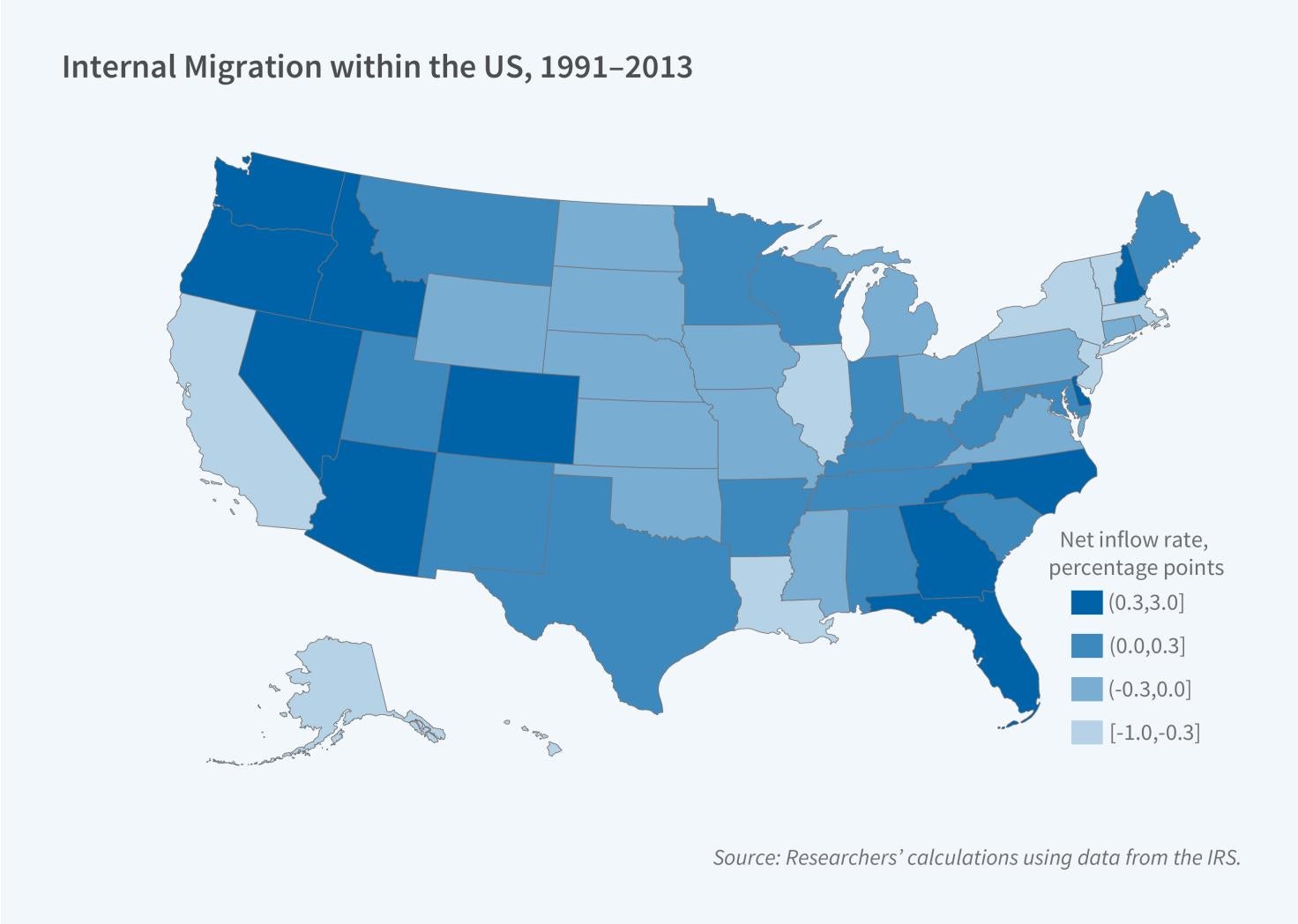
House Prices and Declining Internal Migration in the United States
In recent decades, the United States has experienced a decline in internal migration rates. This development stands in contrast to historically high levels of domestic mobility. William W. Olney and Owen Thompson investigate this phenomenon in The Determinants of Declining Internal Migration (NBER Working Paper 32123). They focus on the role of wages and housing prices in determining migration decisions. Findings show that the overall decline in mobility is primarily due to households becoming less willing to move from high to low home price...
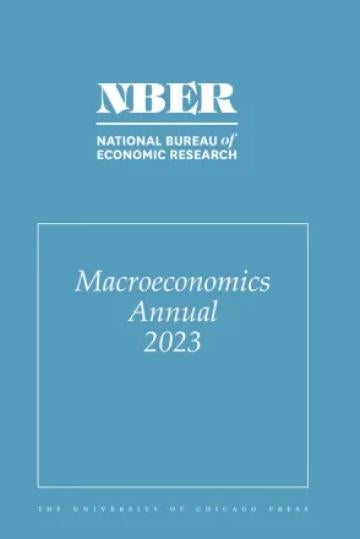
NBER Macroeconomics Annual 2023, volume 38
news article
Martin Eichenbaum , Erik Hurst , and Valerie Ramey , editors.
The NBER Macroeconomics Annual features research by leading scholars on important issues in contemporary macroeconomics.
David Berger , Kyle Herkenhoff , Andreas Kostol , and Simon Mongey consider the importance of market power in the labor market and develop a theory of monopsony that incorporates worker-firm-specific preference heterogeneity, search frictions, and firm granularity. They apply this theory to analyze the effects of monopsony on wages, job flows...
From the NBER Reporter: Research, program, and conference summaries
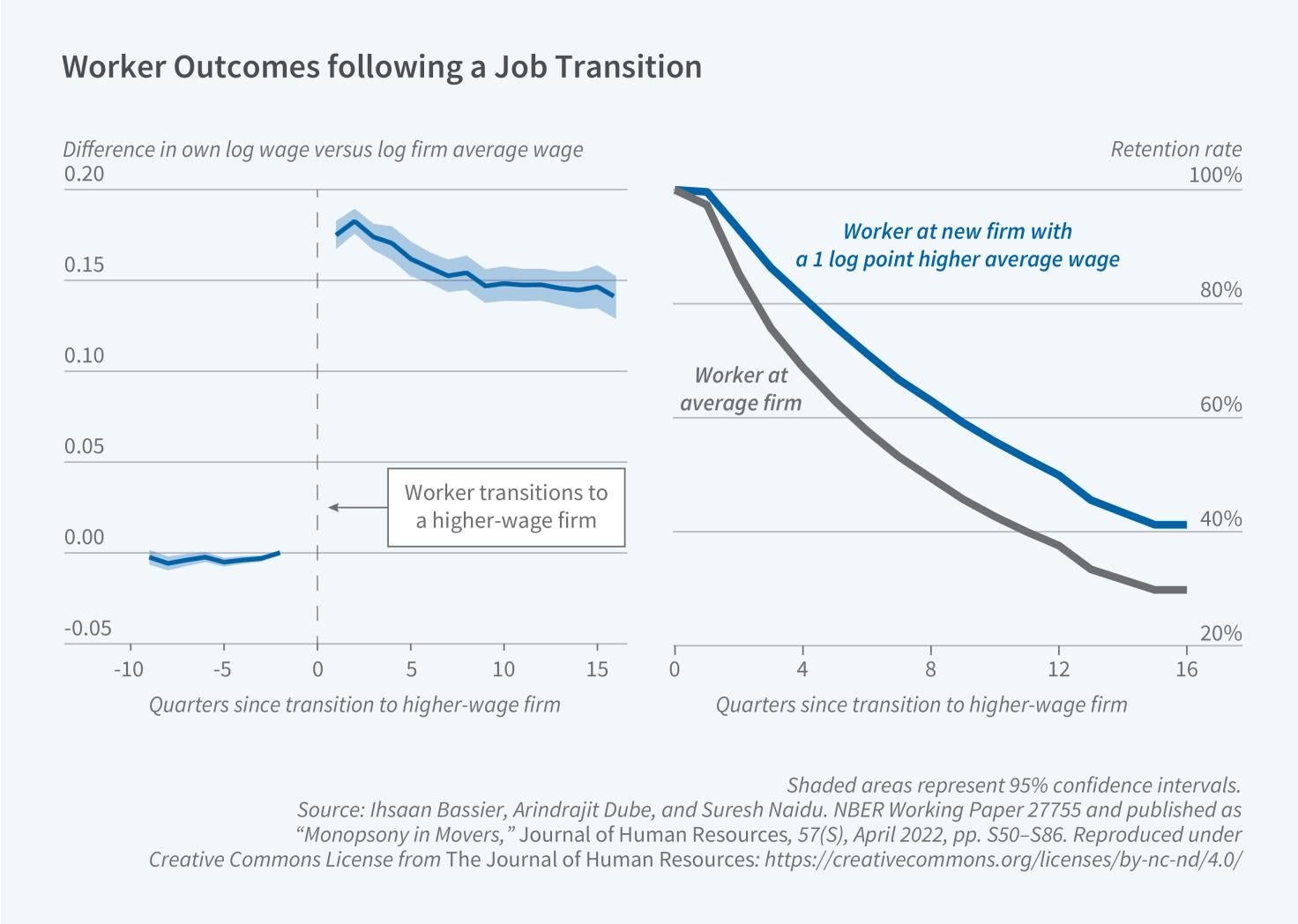
Monopsony Power in Labor Markets
In the standard labor market model taught in introductory economics classes around the world, relationships between firms and workers are just another transaction, mediated by the impersonal market forces of supply and demand. From this perspective, the labor market is best described as being perfectly competitive, where wages are set by the market, with little room for any employer choice.
From the NBER Bulletin on Entrepreneurship
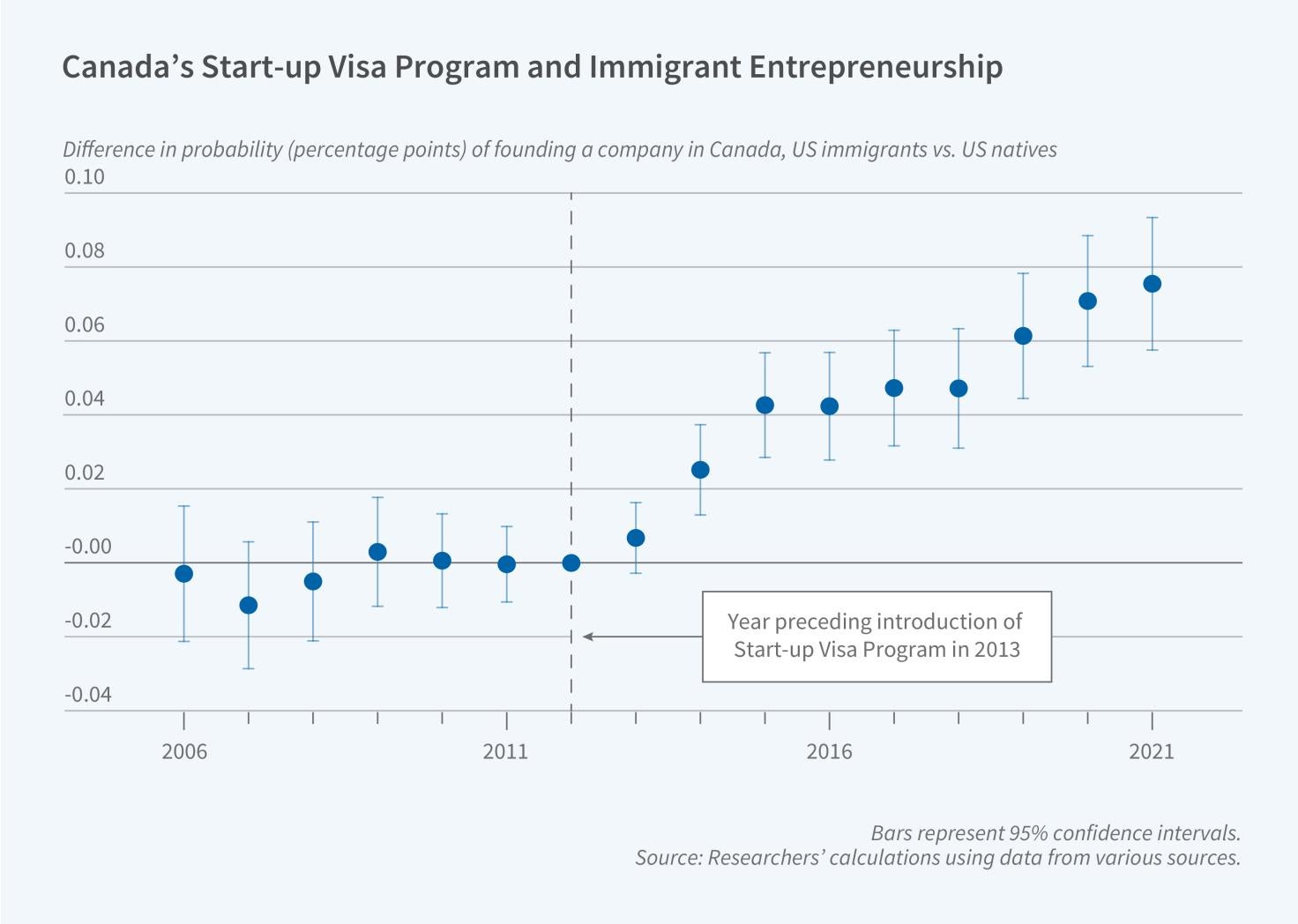
Immigration Policy and Entrepreneurs’ Choice of Startup Location
Immigrants play a significant role in the entrepreneurial landscape. In the United States, immigrants are 80 percent more likely to start businesses than native-born Americans. More than half of America's billion-dollar startup companies trace their roots to immigrant founders. There is limited research, however, on the factors that influence immigrants' decisions about where to locate their startup businesses.
From the NBER Bulletin on Health
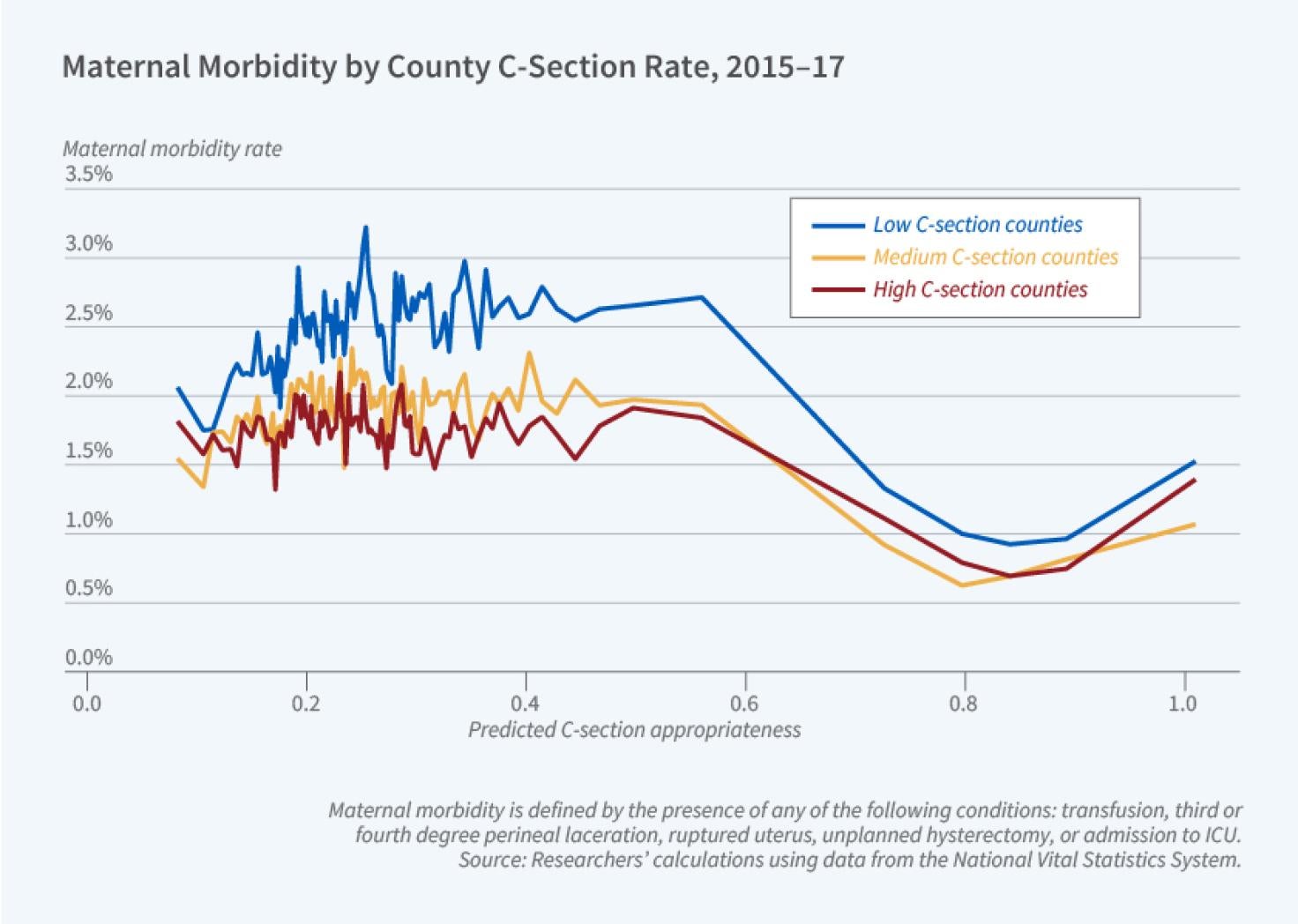
C-section Rates and Birth Outcomes
Cesarean section (C-section) is the most common surgical procedure performed in the United States. Sarah Robinson , Heather Royer , and David Silver report that C-section rates for first-time, singleton births increased from 24 percent to 32 percent between 1989 and 2017 alongside significant changes in medical practices during this period. In 2001, for example, the American College of Obstetricians and Gynecologists began recommending C-sections for breech births. The rising rate of C-sections has sparked a debate about whether this procedure is being overused.
In Geographic Variation in Cesarean Sections in the United States: Trends, Correlates, and Other Interesting Facts (NBER Working Paper 31871), the researchers study how cross-county differences in C-section usage correlate with infant and maternal...
From the NBER Bulletin on Retirement and Disability
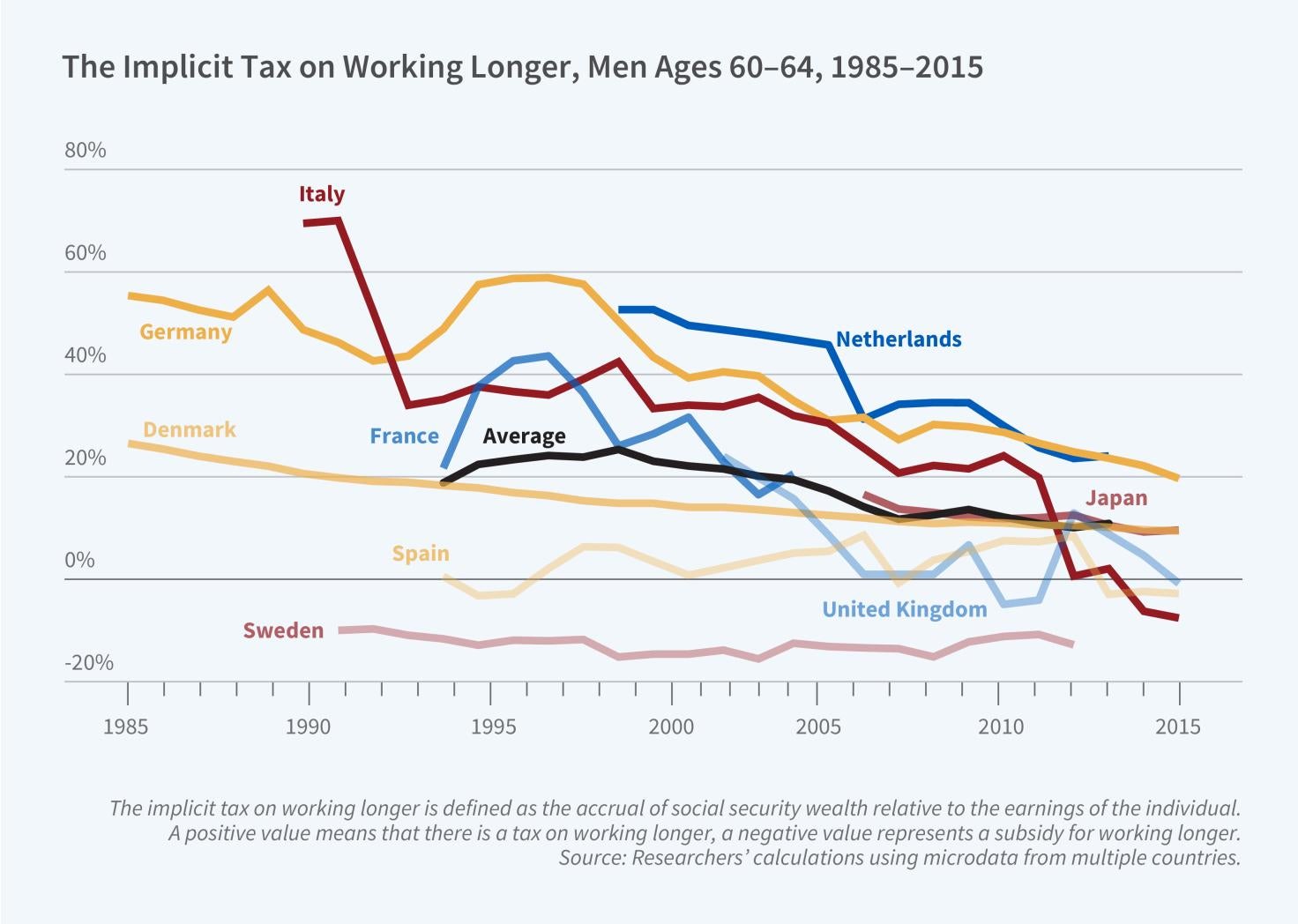
Social Security and Retirement around the World
Over the past 25 years, labor force participation at older ages has increased dramatically. In the 12 countries that are part of the NBER’s International Social Security (ISS) project, participation among those aged 60 to 64 has risen by an average of over 20 percentage points for men and over 25 percentage points for women.
Featured Working Papers
Banks that experienced larger losses in the value of their securities holdings during the 2022–23 monetary tightening cycle extended less credit to firms, thereby transmitting higher interest rates to their borrowers, Daniel Greenwald , John Krainer , and Pascal Paul find. The credit decline was larger when the required adjustment to regulatory capital was greater.
Women economists are significantly more likely than men to write gender-related dissertations and bring gender-related topics into a wide range of fields within economics, but over time, men in economics have increased their interest in gender-related topics, according to research by Francisca M. Antman , Kirk B. Doran , Xuechao Qian , and Bruce A. Weinberg .
Adult disenrollments from the Supplemental Nutrition Assistance Program due to noncompliance with the program’s General Work Requirements have negative spillover effects on other members of affected households, including many young children, but have little effect on labor supply, Jason B. Cook and Chloe N. East find.
US manufacturing workers' employment and earnings declined after trade liberalization with China, but for workers initially employed in other sectors, the positive impact of greater upstream exposure to lower-cost inputs induced relative earnings gains, Justin R. Pierce , Peter K. Schott , and Cristina Tello-Trillo find.
In Chicago, math and reading achievement, as well as neighborhood socioeconomic status during elementary school, are strong predictors of future felony arraignment and incarceration, but account for less than half of the disparity in outcomes between Blacks and non-Blacks, according to Andrew Jordan , Ezra Karger , and Derek Neal .
In the News
Recent citations of NBER research in the media _______________________________________
Research Projects
Conferences, books & chapters.
Through a partnership with the University of Chicago Press, the NBER publishes the proceedings of four annual conferences as well as other research studies associated with NBER-based research projects.
Research Spotlights
NBER researchers discuss their work on subjects of wide interest to economists, policymakers, and the general public. Recordings of more-detailed presentations, keynote addresses, and panel discussions at NBER conferences are available on the Lectures page.
- Faculty Staff
- Non Academic Staff
- Academic Collaborators
- Accommodation
- Career Services
- Exchange Programs
- Financial Aid & Scholarship
- Guidance & Counselling
- Health Services
- Mentorship Programs
- Notable Alumni

Research Projects
© University of Nairobi 2024. All rights Reserved.
Research Project
Videos from the community ( 0 ).
Why not start the community off by adding a post or uploading a resource?
Notes from the community ( 0 )
Websites from the community ( 0 ).

IMAGES
VIDEO
COMMENTS
This guide provides advice on doing a student-led undergraduate research project in empirical economics to both students and faculty members. For students, research projects are good preparation for graduate school or data-intensive jobs. For faculty, mentorship can be a fulfilling experience, and an undergraduate research project can lead to a ...
The economics of alcohol abuse problems. In this thesis, students can develop several essential issues. First, they can examine how poverty is connected to alcohol abuse. Second, they can see the link between alcohol consumption and productivity. To sum up, students can elaborate on the economic costs of alcohol abuse.
Research Proposal. The maximum length of the write-up should be 3 pages single-spaced (but less is fine). The goal of this research proposal is to give you a "jump start" on working on a topic that you could (ideally) work on for your second-year paper (or a future paper for your dissertation). If you are in the second year, it is okay for ...
Essays on Inequality and Stagnation, Troy Alexander Ludtka. An Exploration of Stock-Flow Consistent Models: An Analysis of Fiscal Policy Effectiveness, Quinn Patrick McInerney. Gender empowerment in the development economics literature: the language of choice, preferences and agency, Pranay Panday.
Monopoly power in the pharmaceutical industry. Economic analysis of the gig economy. Elasticity of demand for healthcare services. Price discrimination in the hotel industry. Consumer behavior in the sharing economy. Economic analysis of e-commerce marketplaces. The economics of ride-sharing services like Uber.
51+ Economics Project Topics [Updated] General / By Stat Analytica / 21st February 2024. Economics may sound like a daunting subject, but it's all around us, influencing every aspect of our lives. Economic projects delve into various aspects of how societies produce, distribute, and consume products or goods and services.
This study sheds light on the political pathology of fraudulent, illegal, and corrupt business practices. Features of the Chinese system—including regulatory gaps, a lack of formal means of property protection, and pervasive uncertainty—seem to facilitate the rise of mafia systems. 02 Feb 2021. Working Paper Summaries.
Economic Writing Research writing, particularly in economics, demands a delicate balance between innovative thought, rigorous analysis, and nuanced interpretation of data. Beyond deep subject knowledge, scholars are expected to contribute significantly to ongoing debates, primarily through working papers and peer-reviewed articles.
IZA DP No. 15057: Writing Tips for Economics Research Papers - 2021-2022 Edition. Plamen Nikolov. an updated version of this paper is published as DP16276. This document summarizes various tips for economics research papers. Download.
What is IDEAS? IDEAS is the largest bibliographic database dedicated to Economics and available freely on the Internet. Based on RePEc, it indexes over 4,700,000 items of research, including over 4,200,000 that can be downloaded in full text.. RePEc is a large volunteer effort to enhance the free dissemination of research in Economics which includes bibliographic metadata from over 2,000 ...
College students majoring in economics have a range of choices when it comes to research topics. Below are some inspiring economic paper topics you can use as inspiration for your project in college: Effects of gig economy on labor markets. Economic growth and environmental sustainability.
This project can be modified to be a group project. Economics Honors Thesis I: Three Semester Economics Honors Thesis - This is an example of a comprehensive program for scaffolding independent research. It is designed for honors students, but can be modified for any independent research project in economics. A grading rubric is included. Back ...
Economics Research Paper. This sample economics research paper features: 7800 words (approx. 26 pages), an outline, and a bibliography with 36 sources. Browse other research paper examples for more inspiration. If you need a thorough research paper written according to all the academic standards, you can always turn to our experienced writers ...
Programs & Projects. EXPLORE Programs & Projects. Programs. Economics of Aging; Asset Pricing; Children; ... Entrepreneurship Research Boot Camp, Summer 2021. Persuading Investors: A Video-Based Study. ... National Bureau of Economic Research. Contact Us 1050 Massachusetts Avenue Cambridge, MA 02138 617-868-3900
This process is continuous. Before assigning the research papers, students are taught of many elements that affect the economy. This qualifies them to learn real-life economies, day-to-day expenditures as well as expenses. Such basics include elements like medicine, politics, trade, unemployment, poverty, religion, and war with others.
Dissertations from 2023. PDF. Essays on International Trade and Economic Growth, Mateo Hoyos, Economics. PDF. THREE ESSAYS ON MACROECONOMICS AND DEVELOPMENT, Guilherme Klein Martins, Economics. PDF. THREE ESSAYS ON ALLOCATION OF COSTS AND BENEFITS, CREDIT, AND TIME, Anamika Sen, Economics.
Development Economics Research Topics. The relation between development and incentive for migration. The economic consequences of population growth in developing countries. The determinants of high-performing institutions in emerging economies. The impact of globalization on income distribution in emerging economies.
Some of the best research topics in microeconomics that you can use for your thesis or dissertation include: 1. The effect of income changes on consumer choices. 2. The effect of labor force participation on the economy and budget - A comparison. 3. The impact of marital status on the labor force composition: A case of [your country] economy.
More Information. Business Development Manager Daniel Fowler at 424-666-2165 or [email protected] Contact Daniel Fowler. Independent economic research and consulting firm that empowers its clients with objective, data-based analysis and forecasting.
Martin Eichenbaum, Erik Hurst, and Valerie Ramey, editors.. The NBER Macroeconomics Annual features research by leading scholars on important issues in contemporary macroeconomics.. David Berger, Kyle Herkenhoff, Andreas Kostol, and Simon Mongey consider the importance of market power in the labor market and develop a theory of monopsony that incorporates worker-firm-specific preference ...
Research Projects. Project Code. Project Name. Climate Change and Health Outcomes: A case Study of Embu County. INEQUALITY TRENDS AND DIAGNOSTICS IN KENYA. "Transforming Social Inequalities Through Inclusive Climate Action" (the "Project").
The Research Study is a project completed in the first term of 6th year, and is worth 20% of your Economics grade at Higher and Ordinary level. You'll receive a brief (list of topics) in 6th year, from which you choose one and conduct research and analysis. After you conduct the research study itself, you will write up your report on the ...
Suggest a website. Find all the Economics past leaving certificate questions listed by topic with marking scheme showing sample answers. Notes, useful videos and syllabus also listed.
The best way to accomplish any business or personal goal is to write out every possible step it takes to achieve the goal. Then, order those steps by what needs to happen first. Some steps may ...